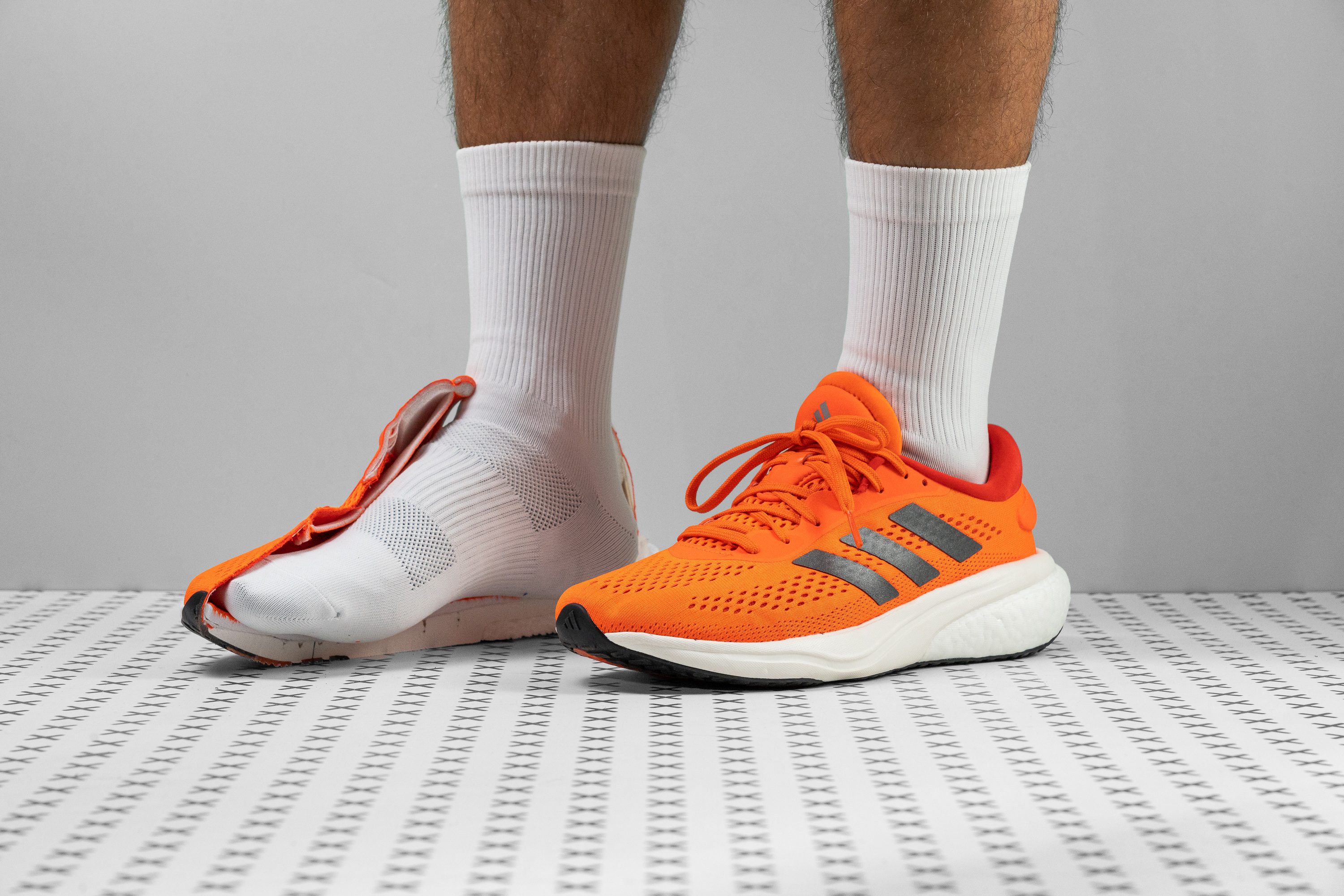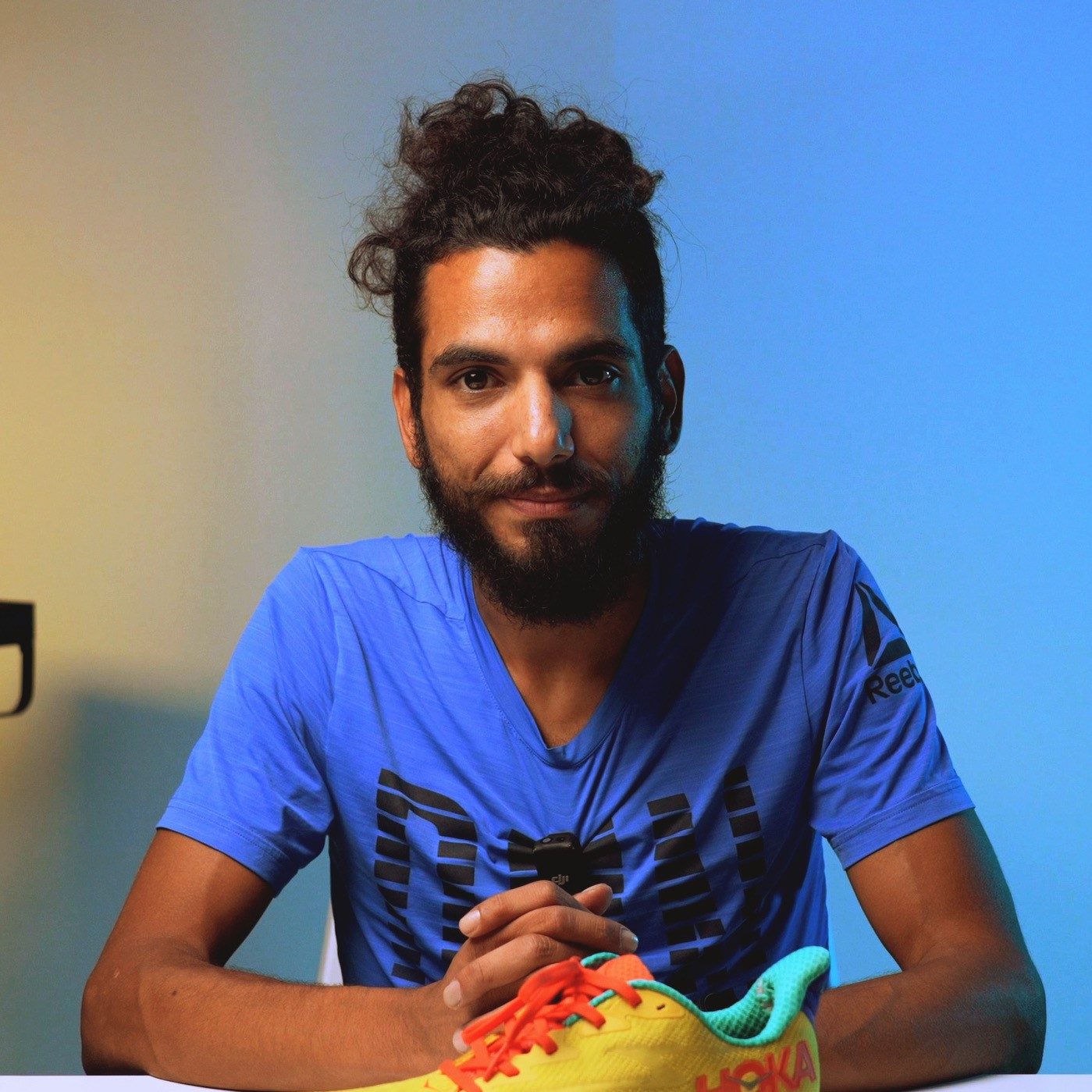Our verdict
Pros
- Budget friendly daily trainer
- Cushy midsole at the heel
- Highly breathable
- Secure lockdown
- Comfortable and secure heel clutch
- Feels stable underfoot
- No lace bite
- No lace bite
- No lace bite
Cons
- Not for long or tempo runs
- Lacking in overall durability
- Tongue slips
- Forefoot lacks cushioning and bounce
Audience verdict
- Top 29% in shoes for gym and running
Comparison
The most similar running shoes compared
+ + Add a shoe | |||||
|---|---|---|---|---|---|
| Audience score | 87 Great! | 81 Good! | 84 Good! | 82 Good! | |
| Price | £90 | £90 | £70 | £80 | |
| Pace | Daily running | Daily running | Daily running | Daily running | |
| Shock absorption | Low | - | - | Low | |
| Energy return | Moderate | - | - | Low | |
| Traction | Low | - | - | Low | |
| Arch support | Neutral | Neutral | Neutral | Neutral | |
| Weight lab Weight brand | 9.7 oz / 276g 9.8 oz / 278g | 9.7 oz / 274g 10 oz / 283g | 11.2 oz / 318g 10.1 oz / 285g | 11.5 oz / 326g 12.1 oz / 343g | |
| Drop lab Drop brand | 14.2 mm 9.0 mm | 12.5 mm 9.0 mm | 12.9 mm 8.0 mm | 11.3 mm 9.0 mm | |
| Strike pattern | Heel | Heel | Heel | Heel | |
| Size | True to size | True to size | True to size | True to size | |
| Midsole softness | Balanced | Balanced | Balanced | Balanced | |
| Difference in midsole softness in cold | Small | Small | Normal | Normal | |
| Toebox durability | Bad | Good | Bad | Decent | |
| Heel padding durability | Bad | Good | Bad | Decent | |
| Outsole durability | Bad | Bad | Decent | Decent | |
| Breathability | Breathable | Breathable | Moderate | Breathable | |
| Width / fit | Medium | Medium | Medium | Medium | |
| Toebox width | Wide | Medium | Medium | Medium | |
| Stiffness | Flexible | Stiff | Moderate | Moderate | |
| Torsional rigidity | Moderate | Moderate | Moderate | Moderate | |
| Heel counter stiffness | Moderate | Moderate | Flexible | Flexible | |
| Heel lab Heel brand | 32.4 mm 32.0 mm | 30.7 mm 25.0 mm | 31.9 mm 34.0 mm | 30.3 mm 25.0 mm | |
| Forefoot lab Forefoot brand | 18.2 mm 23.0 mm | 18.2 mm 16.0 mm | 19.0 mm 26.0 mm | 19.0 mm 16.0 mm | |
| Widths available | Normal | Normal | NormalWide | NormalWide | |
| Orthotic friendly | ✓ | ✓ | ✓ | ✓ | |
| Season | SummerAll seasons | SummerAll seasons | All seasons | SummerAll seasons | |
| Removable insole | ✓ | ✓ | ✓ | ✓ | |
| Ranking | #327 Top 48% | #299 Bottom 21% | #242 Bottom 36% | #289 Bottom 24% | |
| Popularity | #498 Bottom 27% | #318 Bottom 16% | #325 Bottom 15% | #191 Top 50% |
Who should buy
We recommend the Supernova 2 to runner who:
- Are beginners and want a comfortable, well cushioned shoe for easy short to mid-distance runs.
- Want a daily trainer that's budget-friendly to add to their rotation of shoes.
- Need a high-drop shoe with lots of foam at the rearfoot to support heel-striking strides.
- Live in cold climates and want a shoe that stays flexible in frigid conditions.
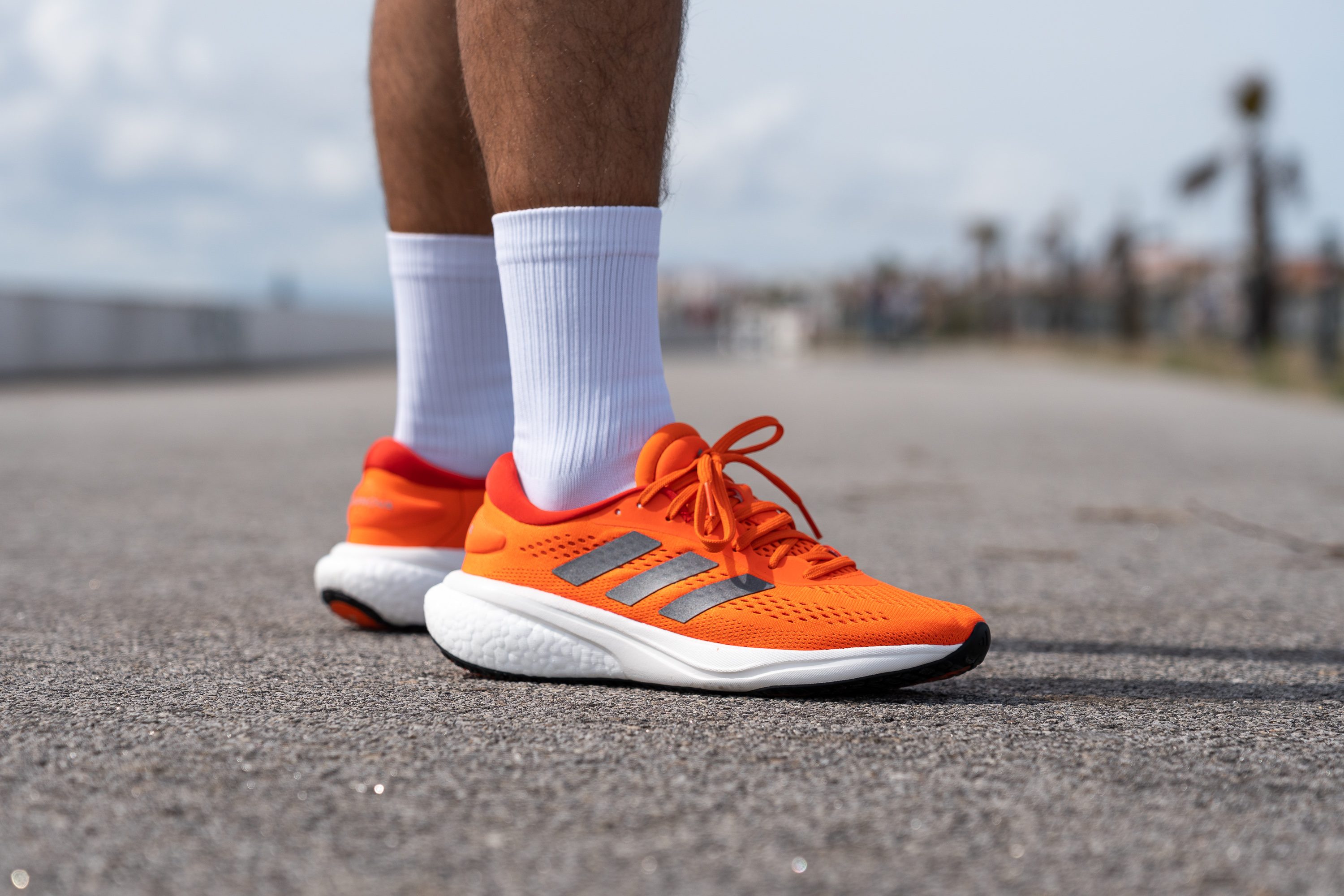
Who should NOT buy
The “Bounce” foam at the forefoot of the Supernova 2’s midsole is minimal and lacks the springiness of the “Boost” foam found at the heel. This meant that the Supernova 2 felt rather dull underfoot on our test runs; with tempo sessions that felt the equivalent of beating a dead horse. We recommend the Brooks Revel 6 as a speedy alternative, or potential pairing, that is similarly easy on the wallet.
Long-distance efforts are similarly taxing in the Supernova 2 which, while flexible, lacks the snappiness to help propel us forward. This meant that we grew more and more fatigued as the mile markers wore on, with the shoe feeling less and less supportive with every stride. For a daily shoe that’s more equipped to handle long hauls, we suggest looking at the Nike Pegasus 40, which is a little less budget-friendly.
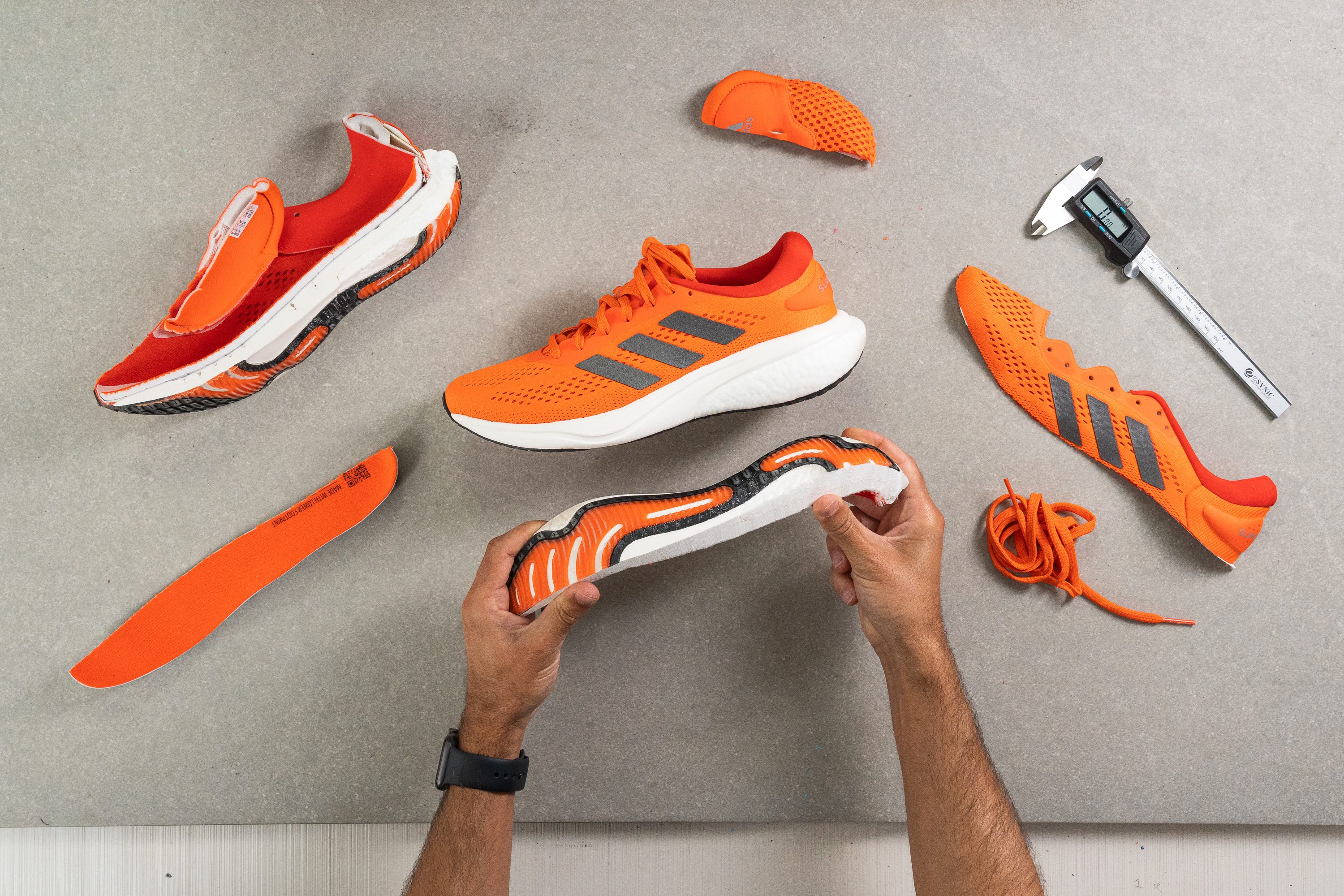
Cushioning
Shock absorption
The wedge-like shape of the Supernova 2 stands out visually—and you can definitely feel it during runs.
With only 103 SA in the heel and just 70 SA in the forefoot, it’s clear this shoe prioritises a ground-connected ride. So remember that if you're considering the Supernova 2, you’ll need to appreciate low-cushioning experience underfoot.
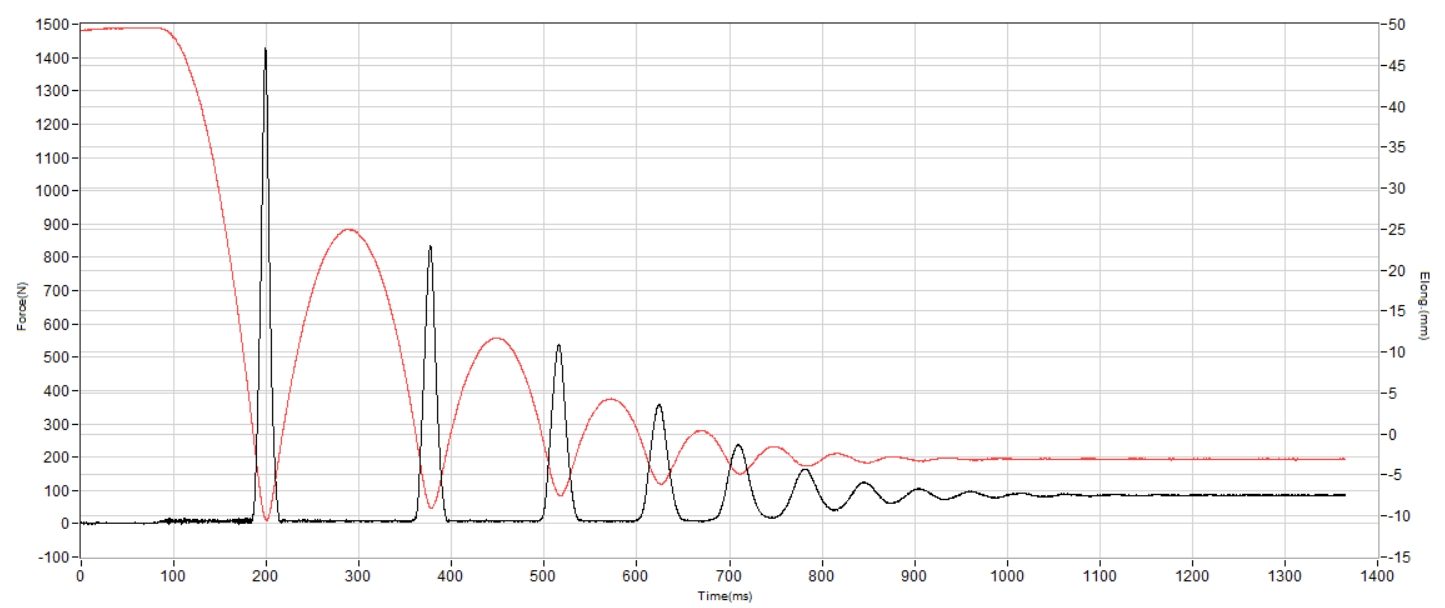
| Supernova 2 | 103 SA |
| Average | 130 SA |
Energy return
The difference in foam composition between the heel and forefoot shows up clearly in our energy return tests. We measured a moderately good 61.9% in the heel, but the forefoot dropped to 54.4%, which is definitely lower than we’d hoped for.
| Supernova 2 | 61.9% |
| Average | 58.6% |
Heel stack
We measured the Supernova 2’s stack at the heel with our caliper and found it to be 32.6 mm, making the officially stated stack height of 32 mm pretty accurate. This measurement makes the Supernova 2 a little shorter than the average shoe at the heel according to our current lab average. This is still more than enough cushioning to provide good impact protection for heel-striking runners.
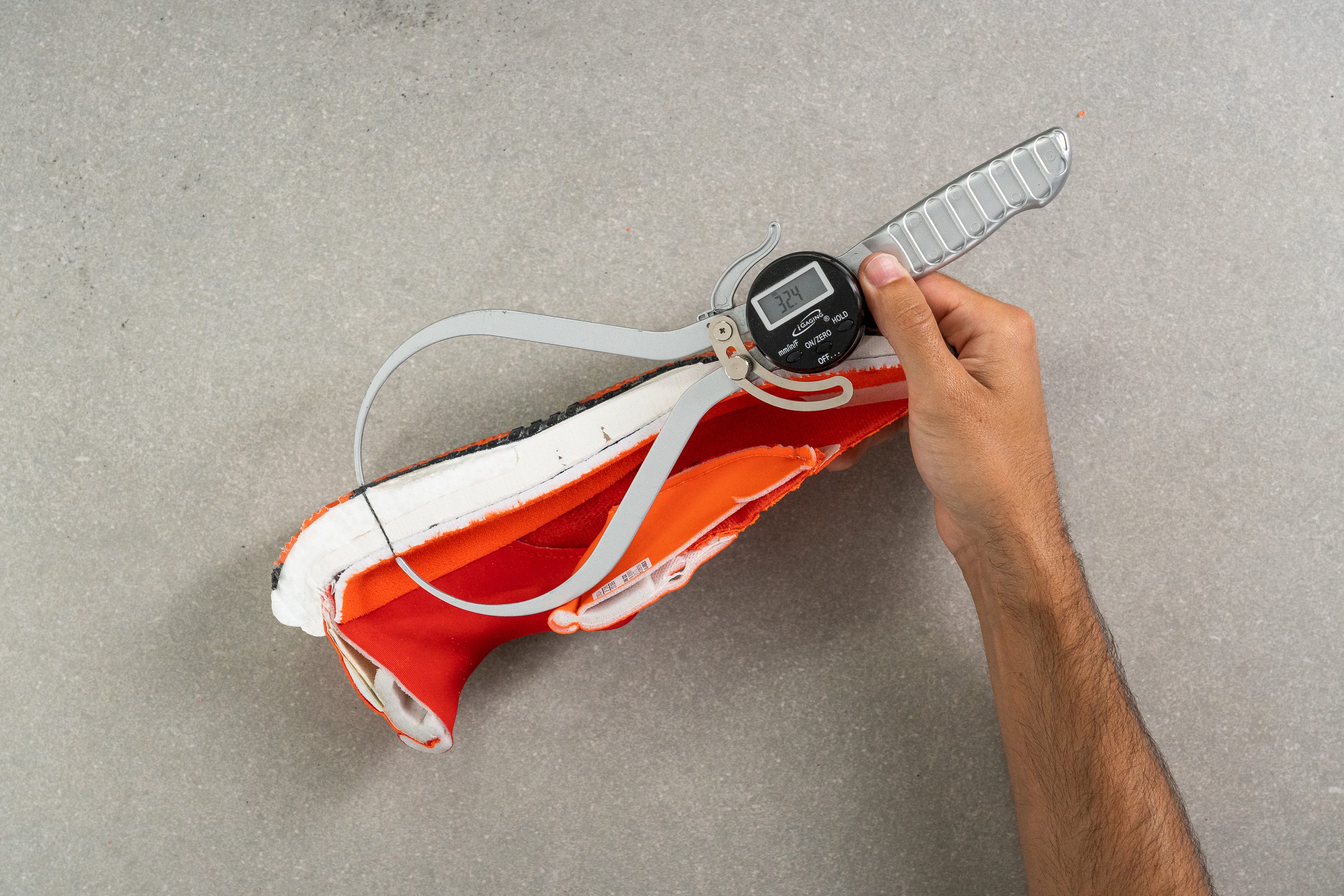
| Supernova 2 | 32.4 mm |
| Average | 34.8 mm |
Forefoot stack
Measuring the stack at the forefoot is where we found a rather large disparity with the official figures stated by Adidas. While they advertise the shoe as sporting a 23 mm stack at the forefoot, we found it to be exactly 18.2 mm using our calliper. This accurate measurement means that the Supernova’s forefoot stack is significantly shorter than our lab average.
Runners with more of a tendency for mid/forefoot striking have better options out there at comparable price point. We recommend the ASICS Gel Excite 9 instead, which features more protective and lively foam at the forefoot.
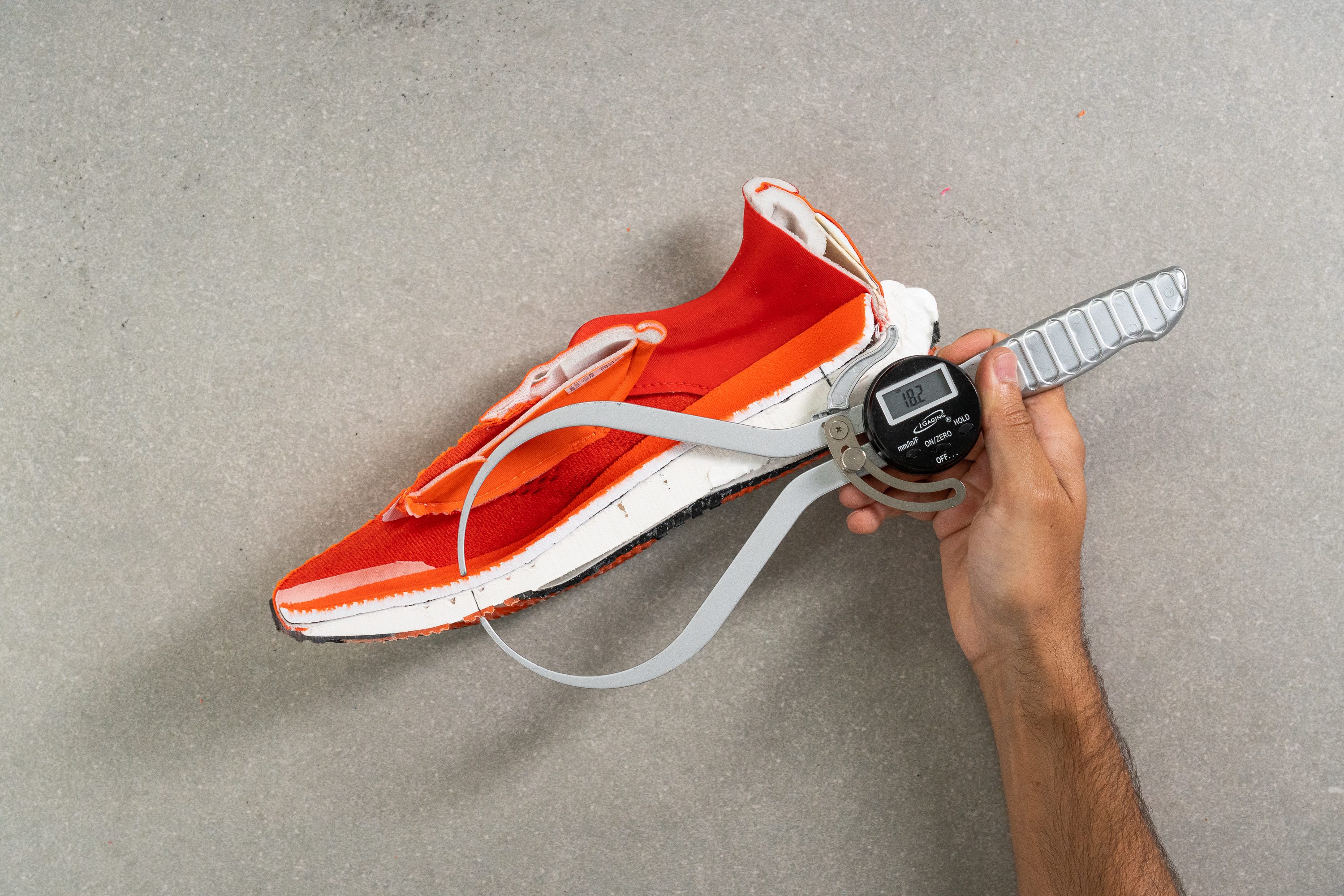
| Supernova 2 | 18.2 mm |
| Average | 26.2 mm |
Drop
These stack measurements leave us with a massive drop of 14.2 mm, much steeper than the 9 mm given by Adidas.
This still puts the Supernova 2 in the category of high-drop shoes, but the sheer scale of this drop height makes the shoe a less-than-ideal choice for forefoot striking runners. Instead we suggest looking at the ASICS Gel Contend 8 as a similarly-priced daily trainer with a milder drop.
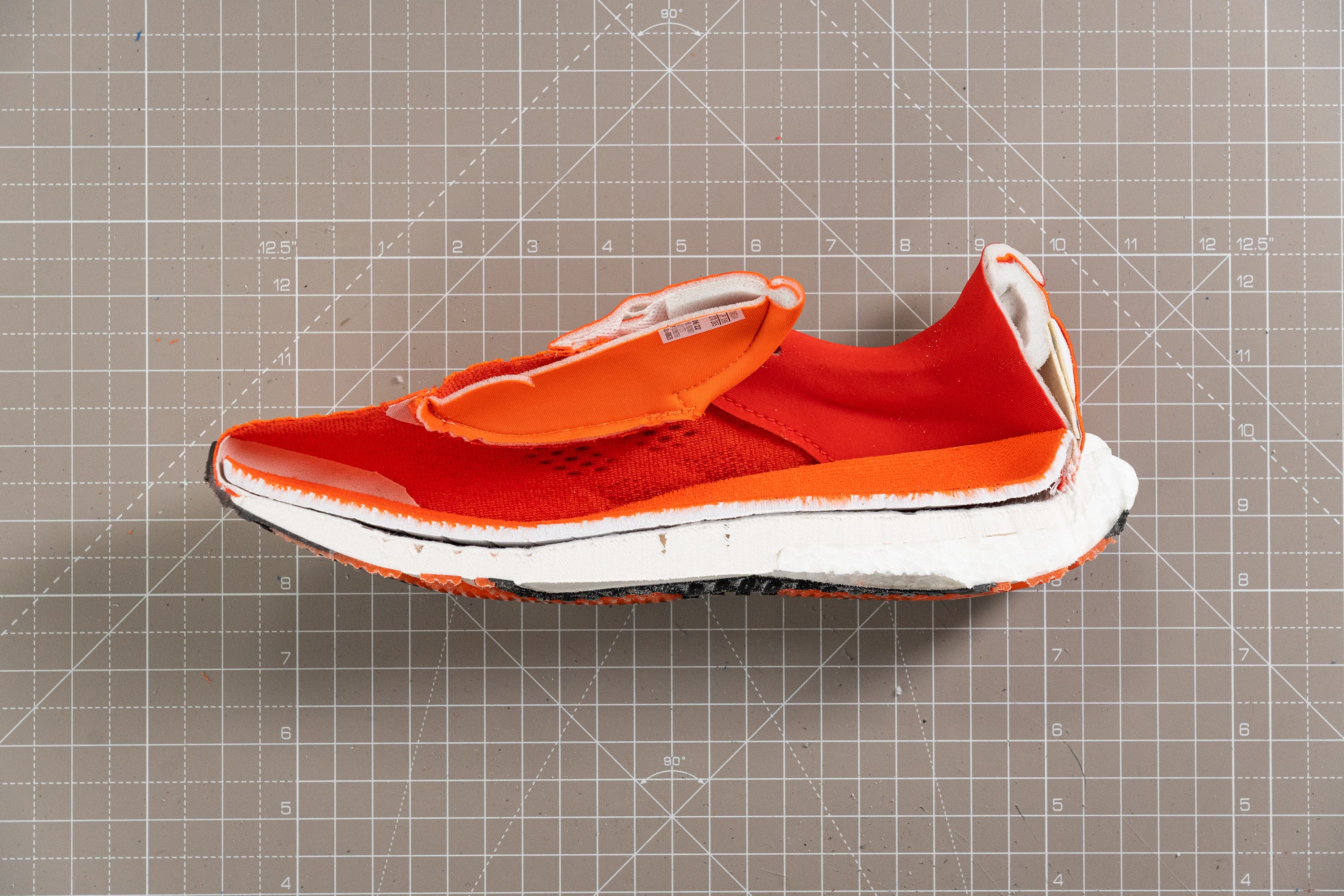
| Supernova 2 | 14.2 mm |
| Average | 8.6 mm |
Midsole softness
To test the softness of the midsole, we pressed our durometer against the Supernova’s cushioning at the heel and got a reading of 29.8 HA. This isn’t as soft as the average shoe, but the ample amount of foam at the rearfoot makes the shoe feel softer than that for heel-strikers.
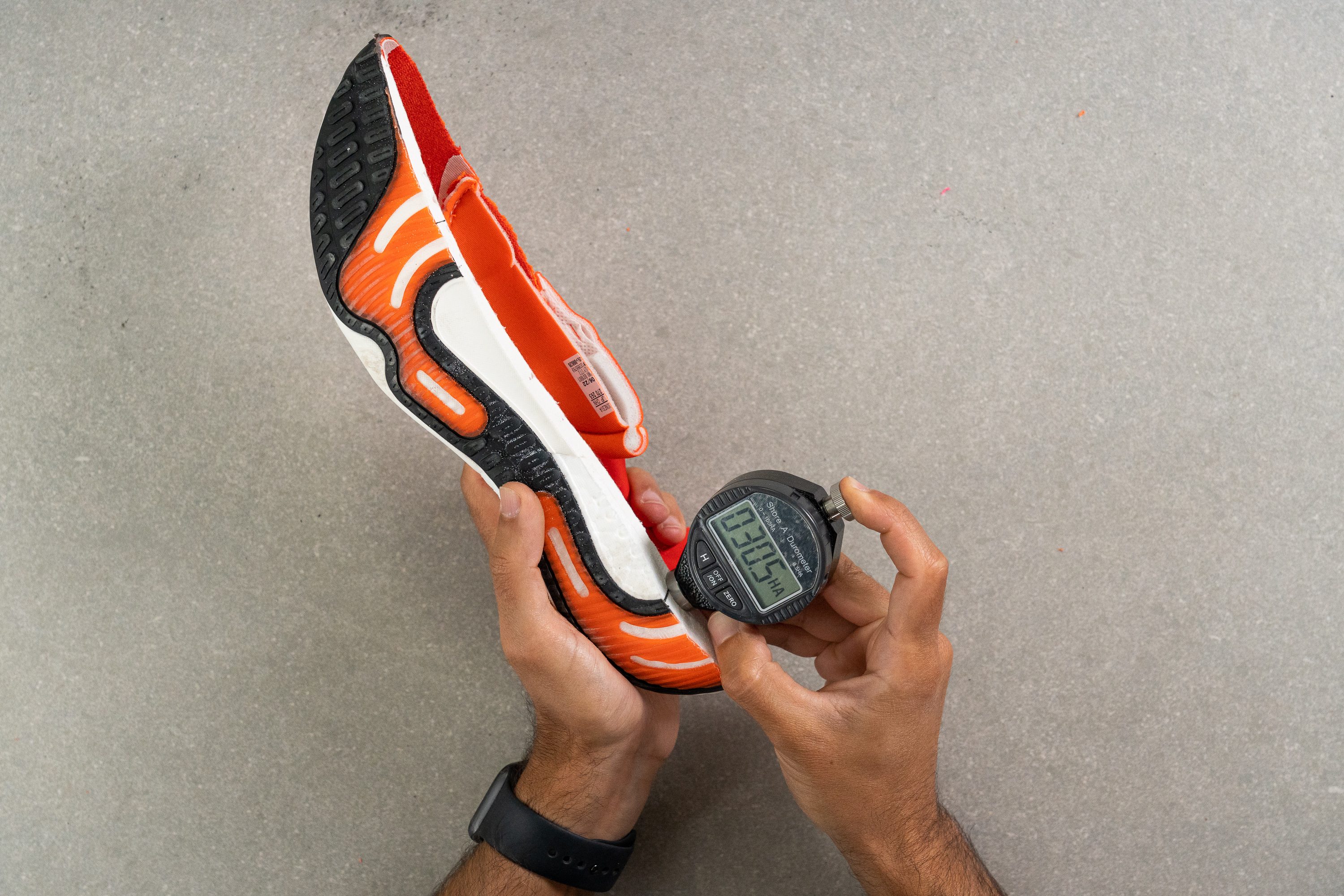
This part of the midsole uses the Adidas “Boost” foam, made up of TPU beads that lend the shoe a cushioned yet bouncy ride that feels quite energetic for a budget shoe.
| Supernova 2 | 29.8 HA |
| Average | 20.4 HA |
Secondary foam
The foam found at the forefoot of the Supernova 2 is marginally softer than at the heel, measuring 27 HA when we pressed our durometer against it.
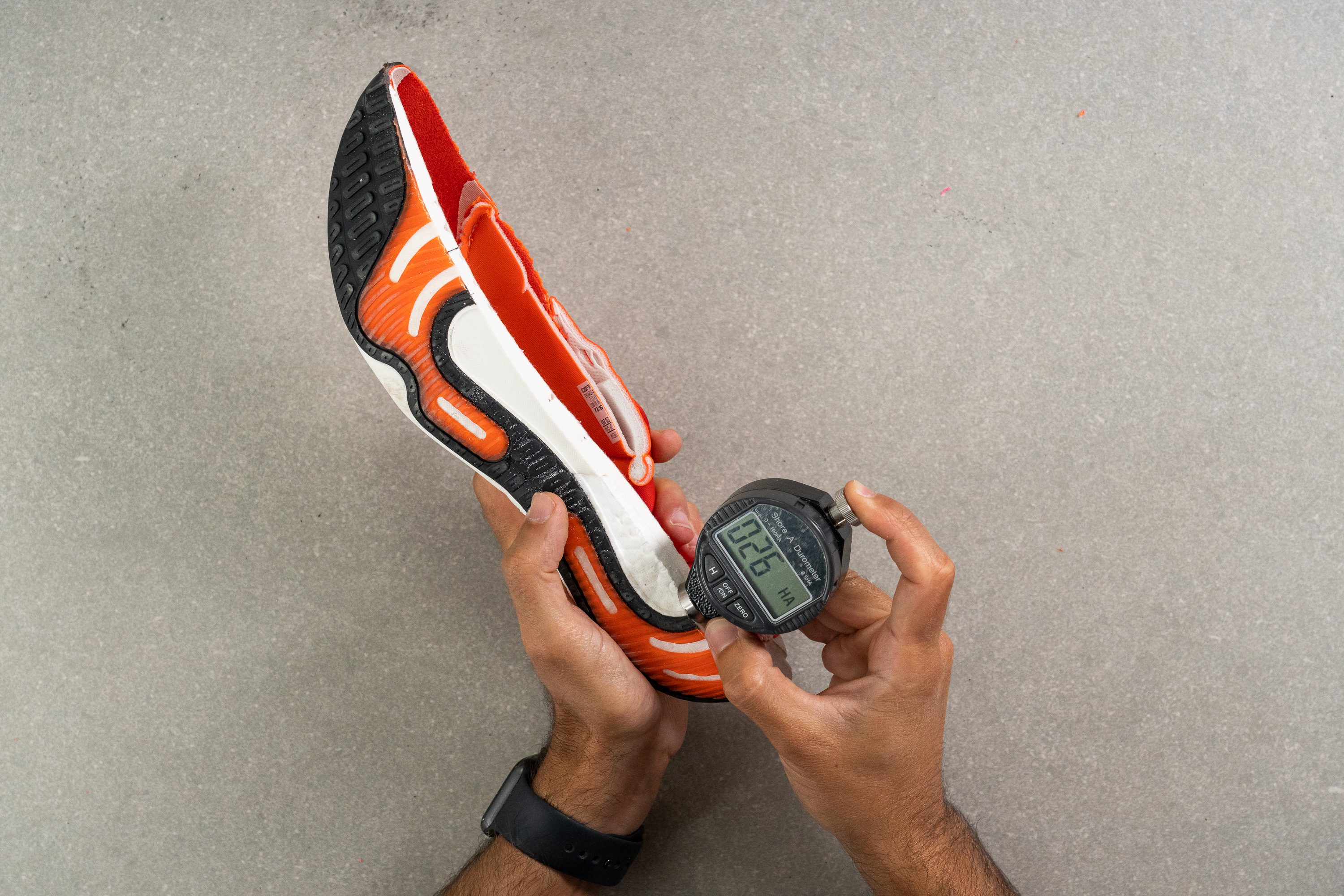
This section of the midsole makes use of Adidas’ “Bounce” foam which, compared to the Boost foam at the heel, is much less lively and feels more in line with the ride of a shoe within this price bracket.
| Supernova 2 | 27.0 HA |
| Average | 22.7 HA |
Size and fit
Size
Adidas Supernova 2 fits true to size (146 votes).
Internal length
| Supernova 2 | 270.3 mm |
| Average | 269.4 mm |
Width / Fit
We measured the toebox with our caliper to be 100.4 mm at its widest point. While this is ever-so slightly wider than our current lab average; the shoe’s upper mesh easily stretches to accommodate wide feet, but with enough elasticity to securely lock them down.
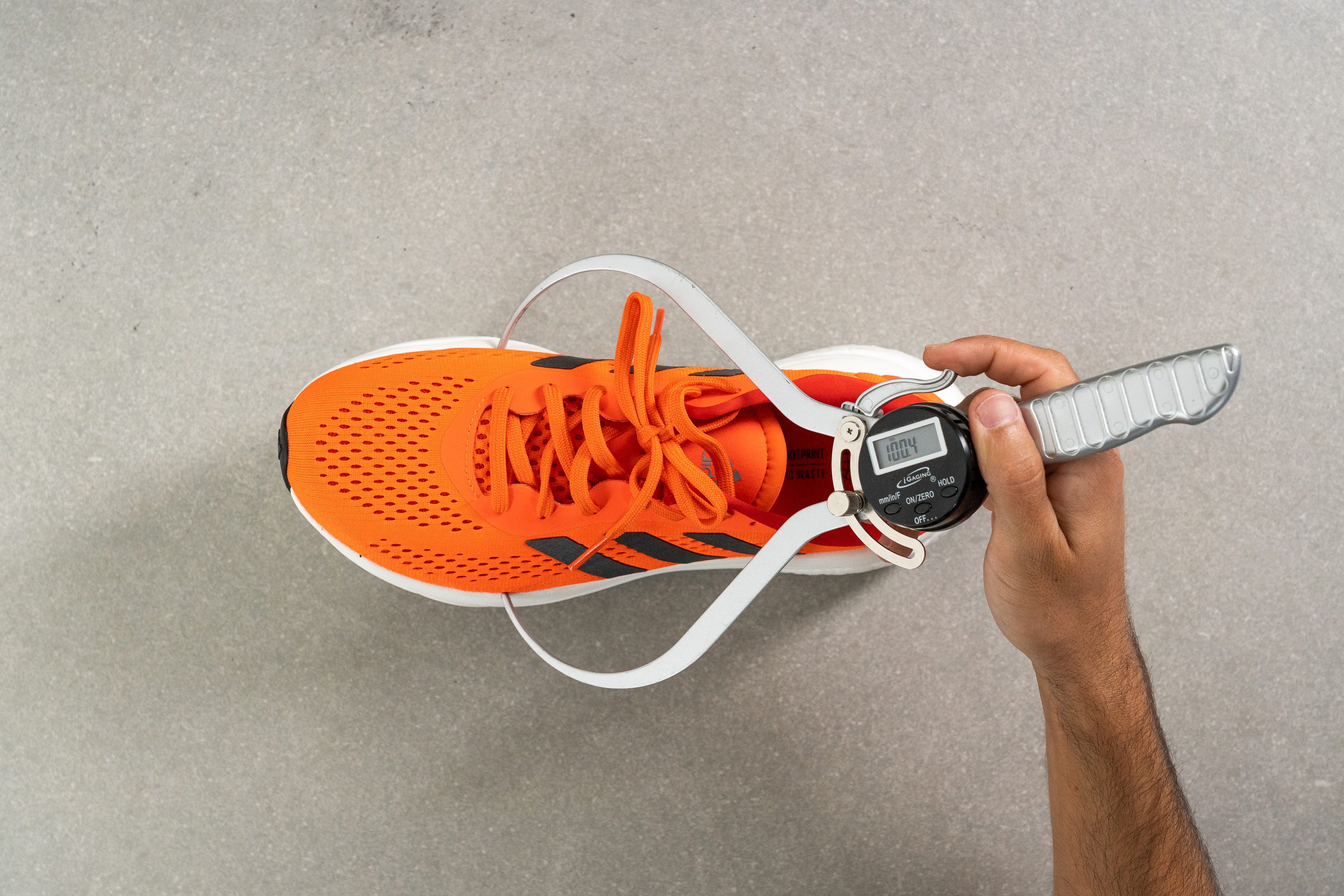
This test follows an older methodology, which is why you don't see recently tested shoes in the chart. Results from different methodologies can not be compared.
| Supernova 2 | 100.4 mm |
| Average | 98.5 mm |
Toebox width
Measuring the toebox at the big toe, we found that the Supernova 2 tapers much less than the average shoe. At 80.4 mm according to our caliper; we definitely had more than enough room for our toes to splay out on our landings during our test runs.
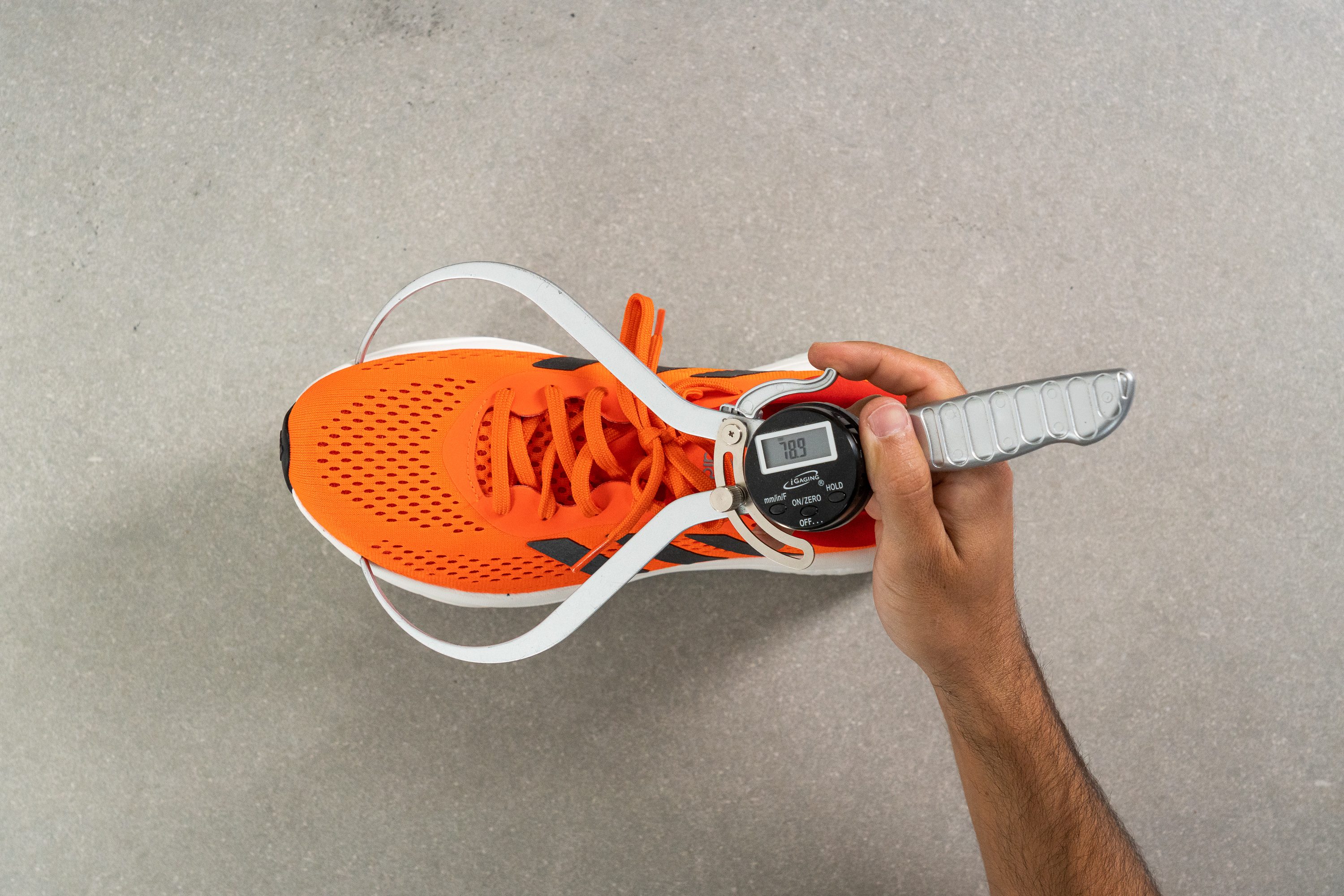
This test follows an older methodology, which is why you don't see recently tested shoes in the chart. Results from different methodologies can not be compared.
| Supernova 2 | 80.4 mm |
| Average | 78.4 mm |
Traction / Grip
Despite its lack of durability, the Supernova 2’s outsole is super grippy and provided us with more than enough traction during our daily runs, even when faced with wet asphalt.
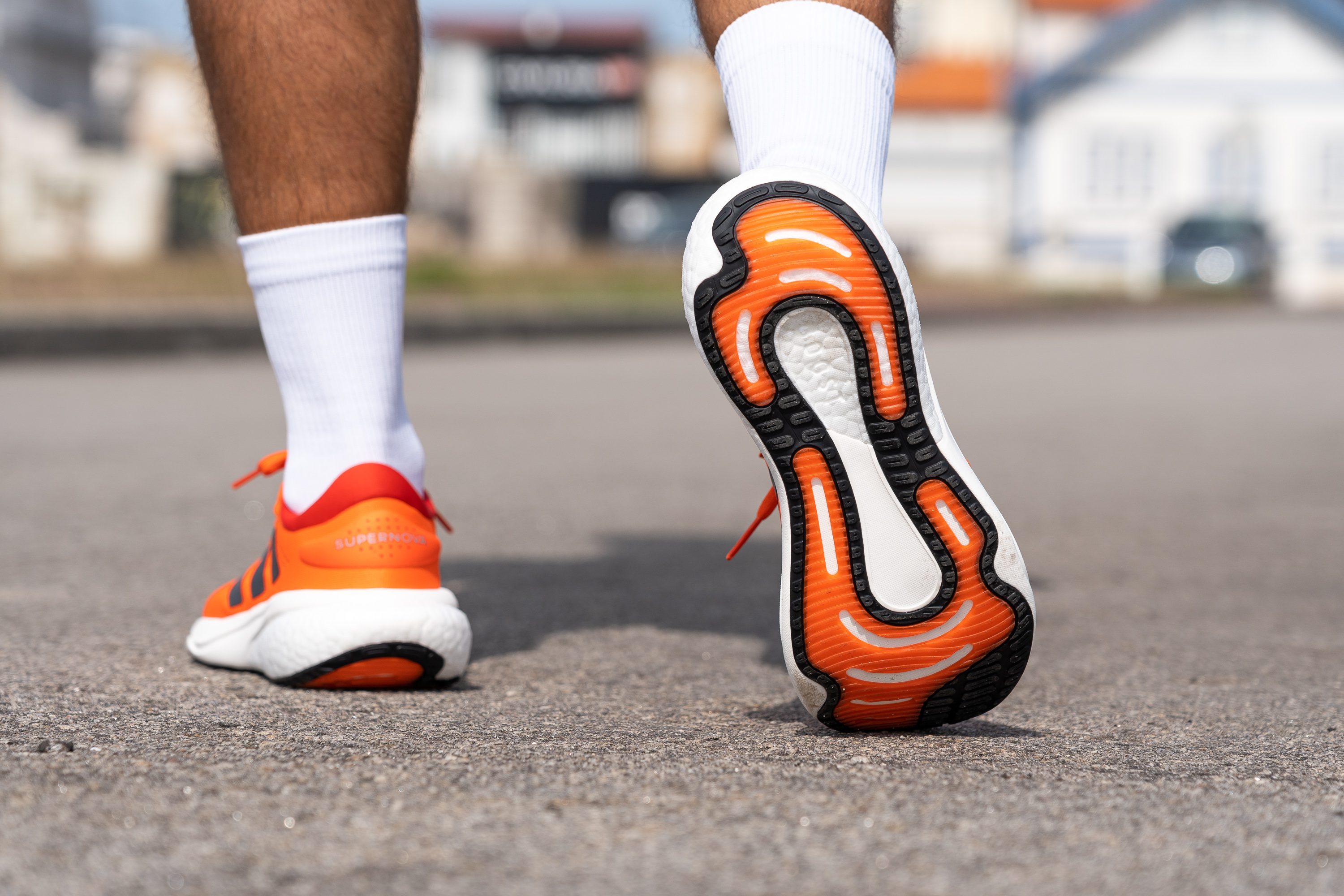
We also felt super confident taking speedy corners in the Supernova 2 while out on our runs.
Traction test
We found the traction from the Supernova 2 to be underwhelming in both dry and wet conditions, delivering a lackluster 0.21 in our SATRA TM144 grip test—a number that trails behind even many other budget-friendly models we’ve tested.
| Supernova 2 | 0.21 |
| Average | 0.49 |
Outsole design
The outsole of the Adidas Supernova 2 features a swirl-like rubber layout with a mix of wide grooves and exposed foam in the midfoot. Rubber coverage is good, especially in the heel and forefoot. The midfoot cutout lightens the shoe, yet adds no traction value.
Its curvy, multi-colour design adds visual flair, though as we found, it sacrifices function for style.

Flexibility / Stiffness
To test the flexibility of the Supernova 2, we secure the shoe to our machine and measure how much force is required to bend it 30-degrees. With a result of only 9.4N; the Supernova 2 is considerably more flexible than our current lab average. This does contribute to the Supernova 2’s overall comfort.
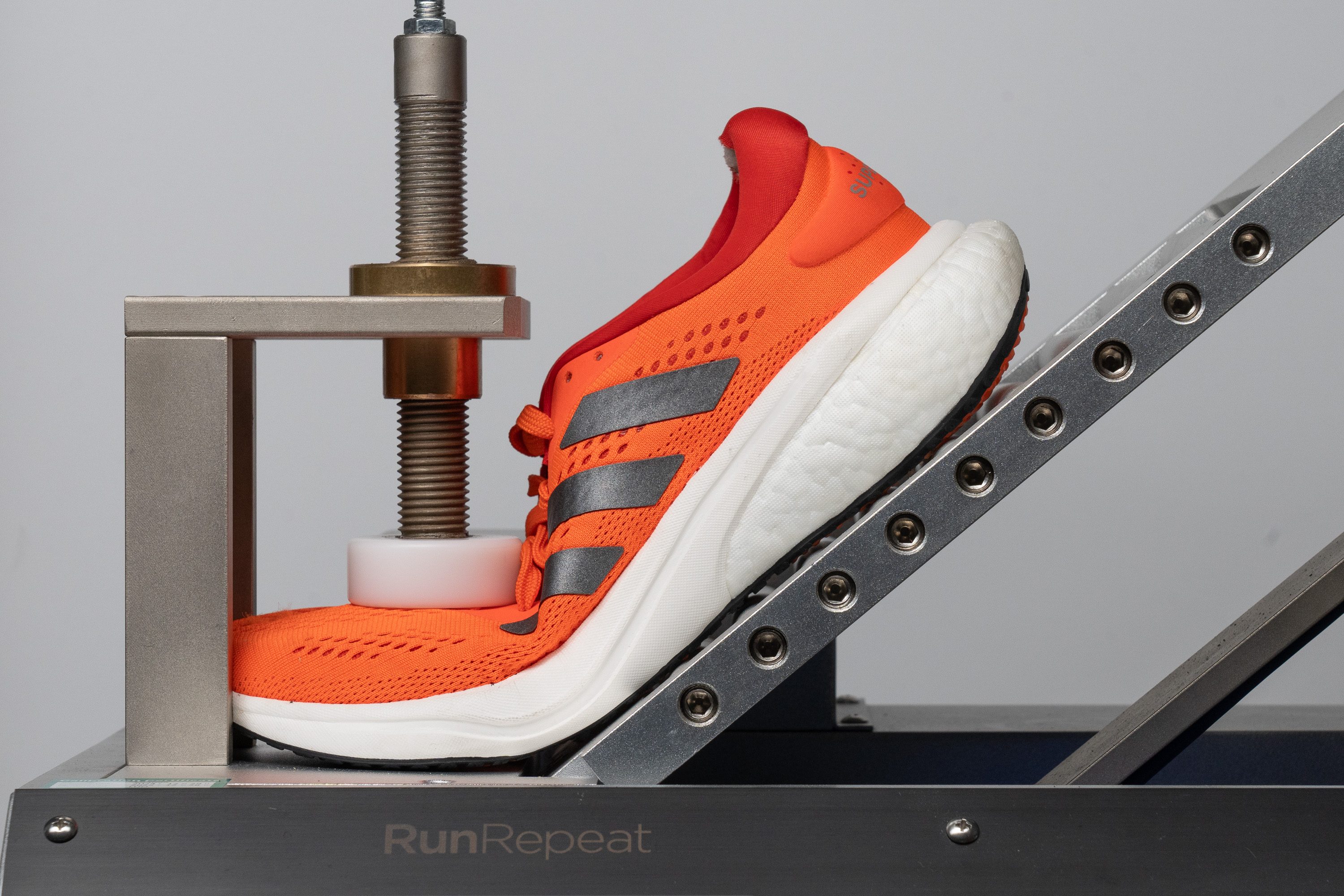
| Supernova 2 | 9.4N |
| Average | 15.3N |
Stiffness in cold (%)
Even after twenty minutes in the freezer, the Supernova 2 remains an extremely pliable shoe, requiring only 22N of force to bend the shoe 90-degrees. This is much more flexible compared to our lab average and means that the shoe should still feel plenty flexible even in the coldest conditions.
With a variance of 57.1% in the shoe’s flexibility between warm and cold conditions, the Supernova 2 does get more rigid than the average shoe does when exposed to the cold. Still, with a result of 22N, the shoe is much more flexible than the average shoe whether under similar conditions or at room temperature!
| Supernova 2 | 57% |
| Average | 33% |
Weight
Even with the scant use of rubber in the outsole, the Supernova 2 is heavier than our current lab average at 9.7 Oz (276g). This can be explained by all the padding and comfort features found in the shoe.
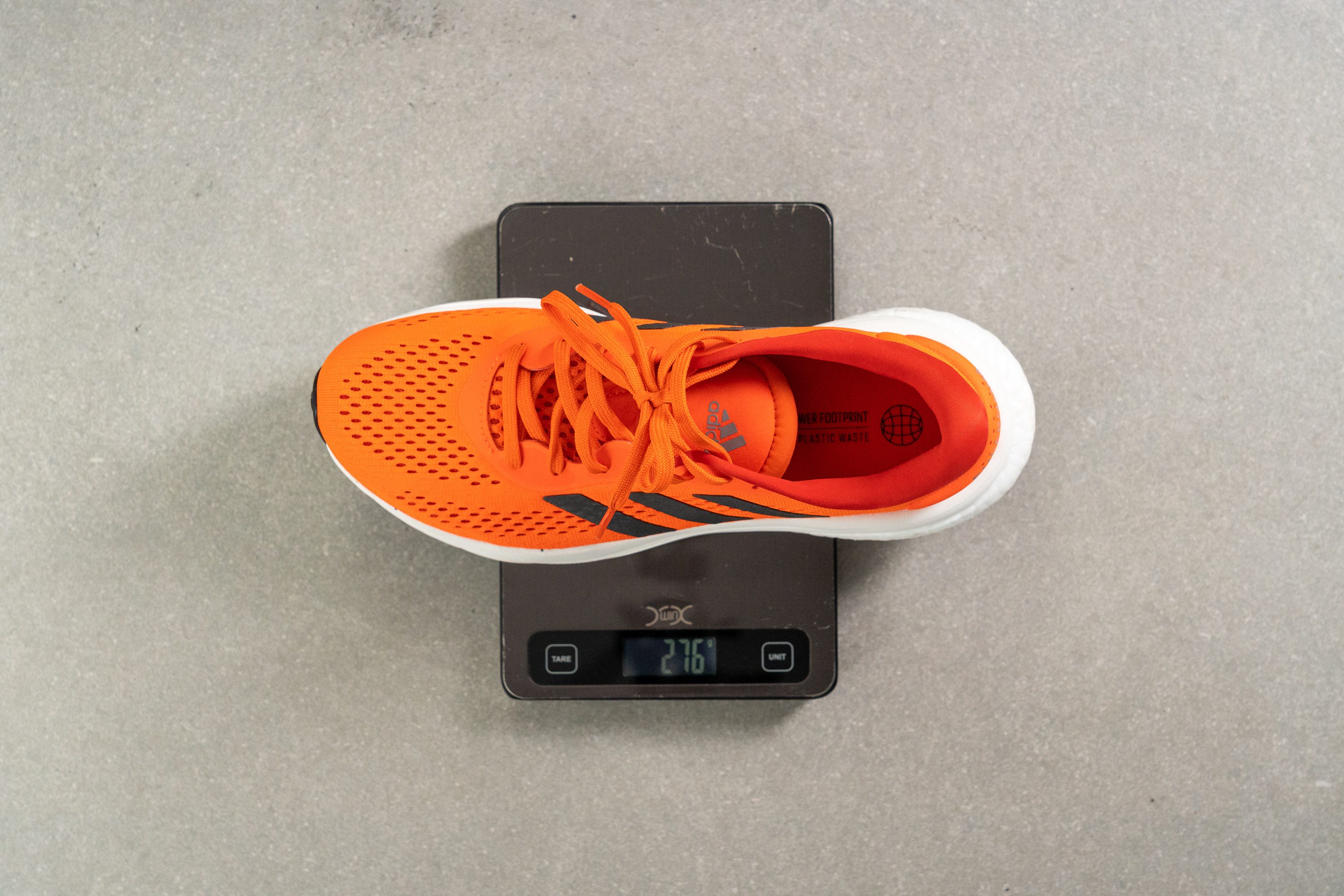
| Supernova 2 | 9.7 oz (276g) |
| Average | 9.3 oz (264g) |
Breathability
Shining a light through a cross-section of the Supernova 2, one might be led to believe that the Supernova 2 isn’t a very breathable shoe; with light only peaking through the perforations in the shoe’s upper.
Pumping smoke through the shoe, however, reveals a different story altogether. We can see how easily heat is able to escape through the many gaps in the upper material. Even the heavily padded tongue is ventilated enough to allow smoke to filter out effectively. We therefore give the Supernova a perfect 5 out of 5 for breathability.
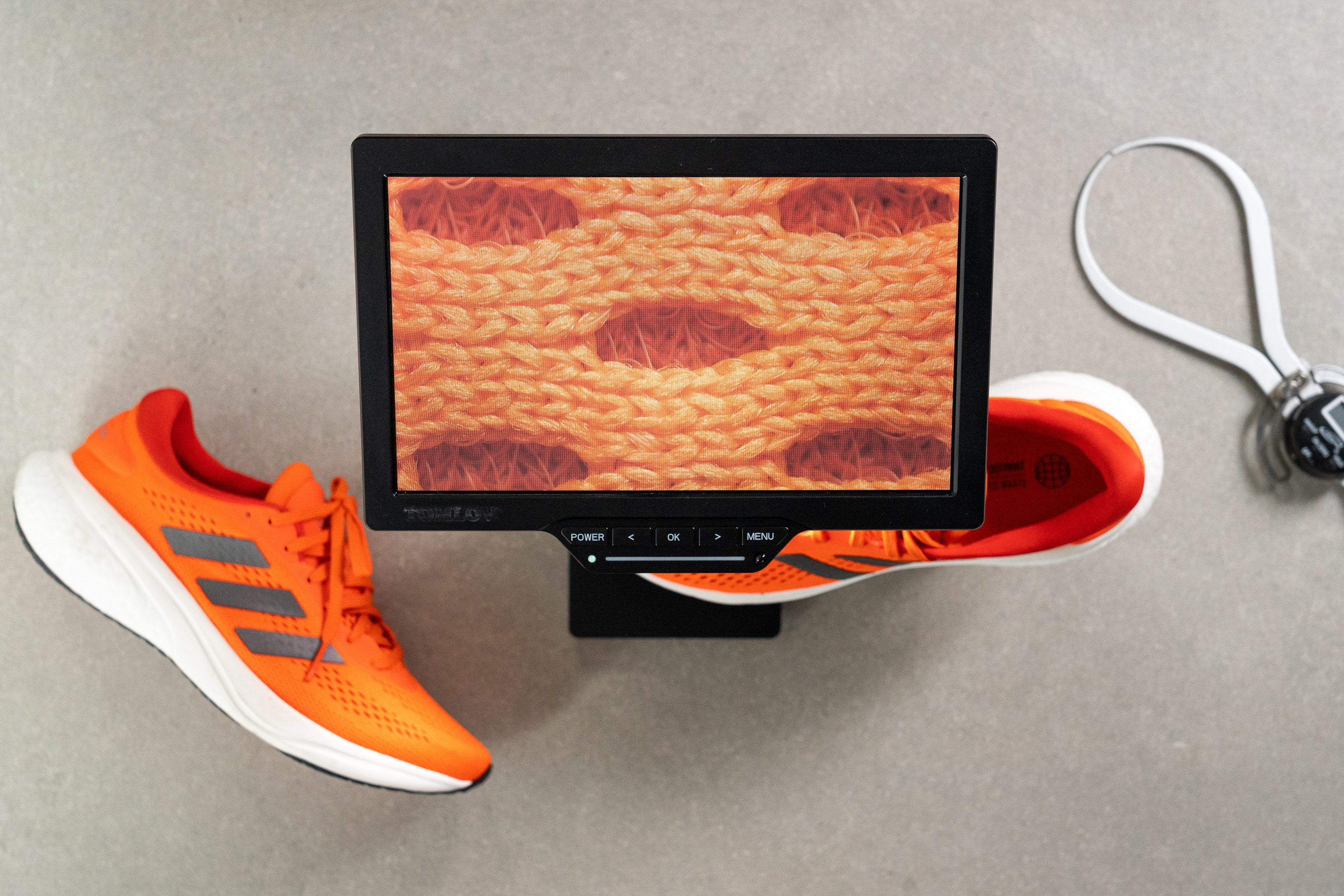
The breathability of the Supernova 2 is easy to understand when we look at its upper material through a microscope. The mesh is made up of finely braided material, which in itself is conducive to air flow, that splits to form evenly spaced perforations throughout the toebox and tongue.
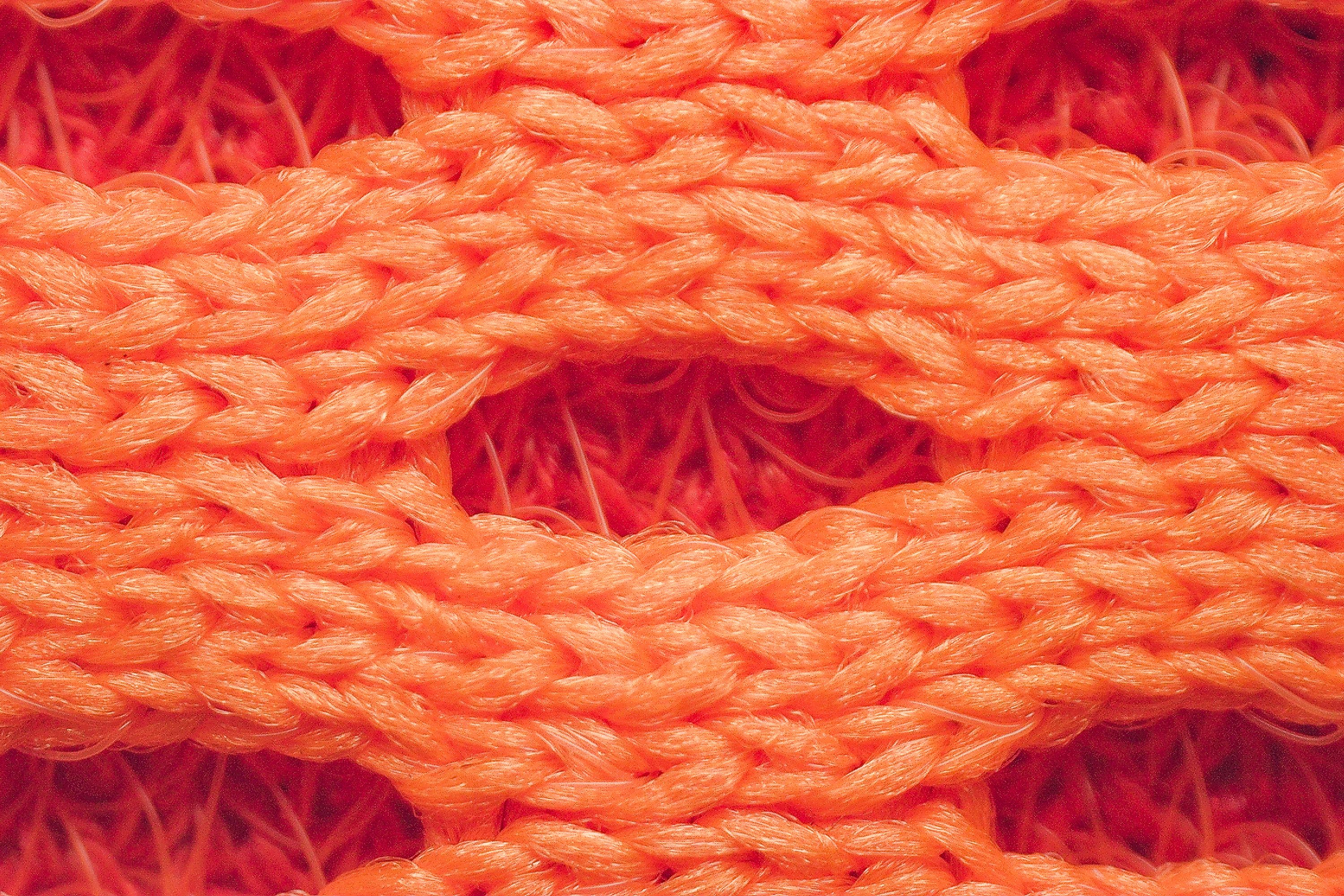
| Supernova 2 | 5 |
| Average | 3.7 |
Stability
Lateral stability test
With its robust platform, we definitely felt sure footed in the Supernova 2. Performing the simple and practical test of shifting our weight from side to side on one foot, we didn’t feel the shoe tipping over too far or prone ankle rolls.
Torsional rigidity
Despite lacking the torsion plate found in other Adidas models, the Supernova 2 still falls within the average range of torsional rigidity with a score of 3 out of 5 on our subjective scale. As you can see from the video, we were able to twist and contort the shoe in all directions without being faced with too much resistance.
This level of flexibility meant that the shoe was able to adapt to the shape of our foot during our test runs while still giving us a good, stable landing platform.
Pronating runners, however, will benefit from a stiffer shoe that is more equipped to prevent the inward rolling of the foot. We recommend the Brooks Launch GTS 10 as an alternative.
| Supernova 2 | 3 |
| Average | 3.5 |
Heel counter stiffness
Pinching and squeezing the Supernova 2’s heel counter, we were able to contort it in all directions but with some level of resistance. We therefore scored the shoe a 3 out of 5 on our subjective scale, making it fall right around the average range for heel counter stiffness based on the shoes we’ve tested so far.
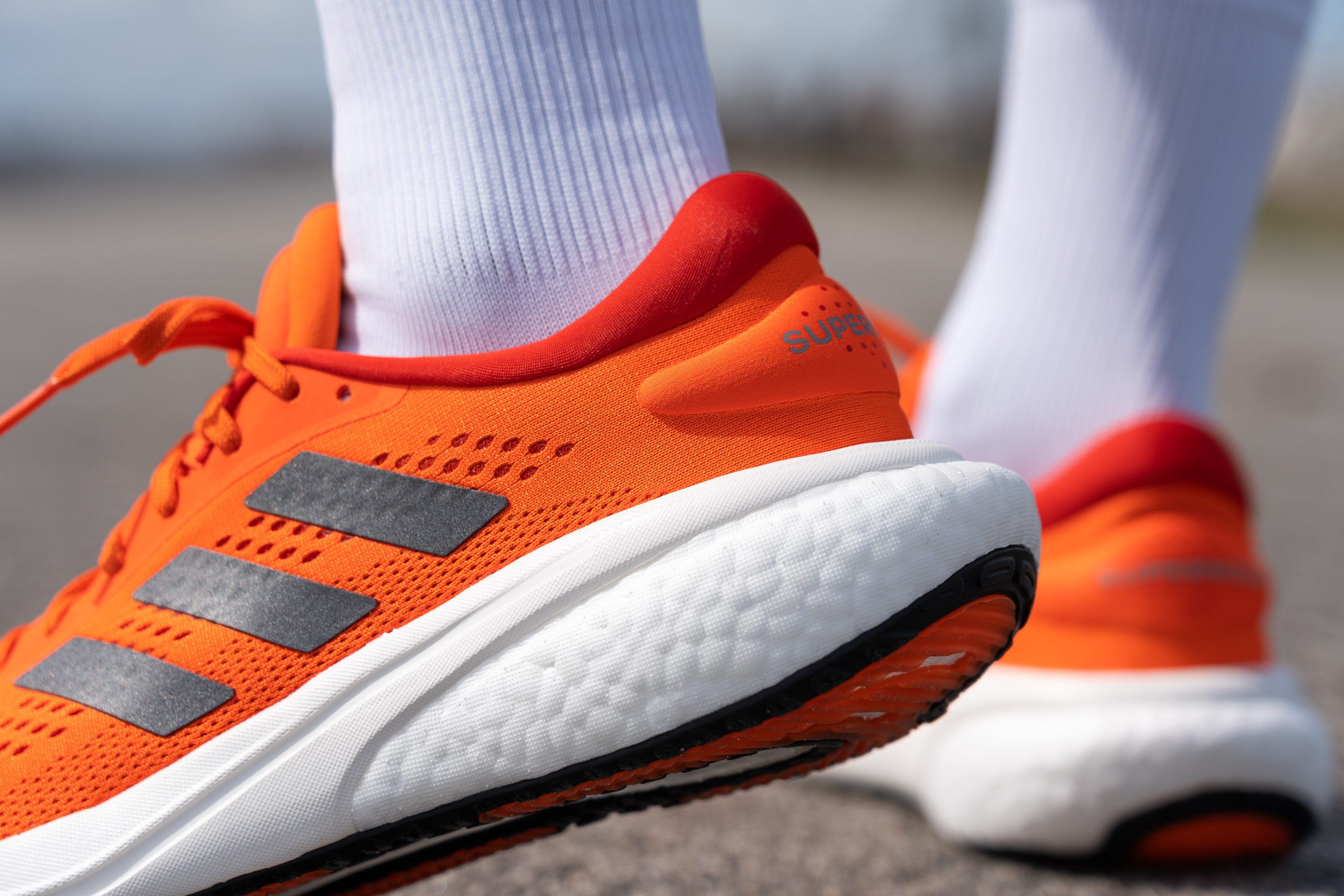
This level of stiffness gave us a good lockdown around the heel and prevented any slippage; with the abundant padding around the collar softly caressing our foot in place without squeezing the life out of our Achilles.
| Supernova 2 | 3 |
| Average | 2.9 |
Midsole width - forefoot
Using our caliper, we measured the Supernova 2’s midsole and found it to be 114 mm wide at the forefoot. This is a little wider than our current lab average and means that forefoot strikers have plenty of surface to land on inside the shoe.
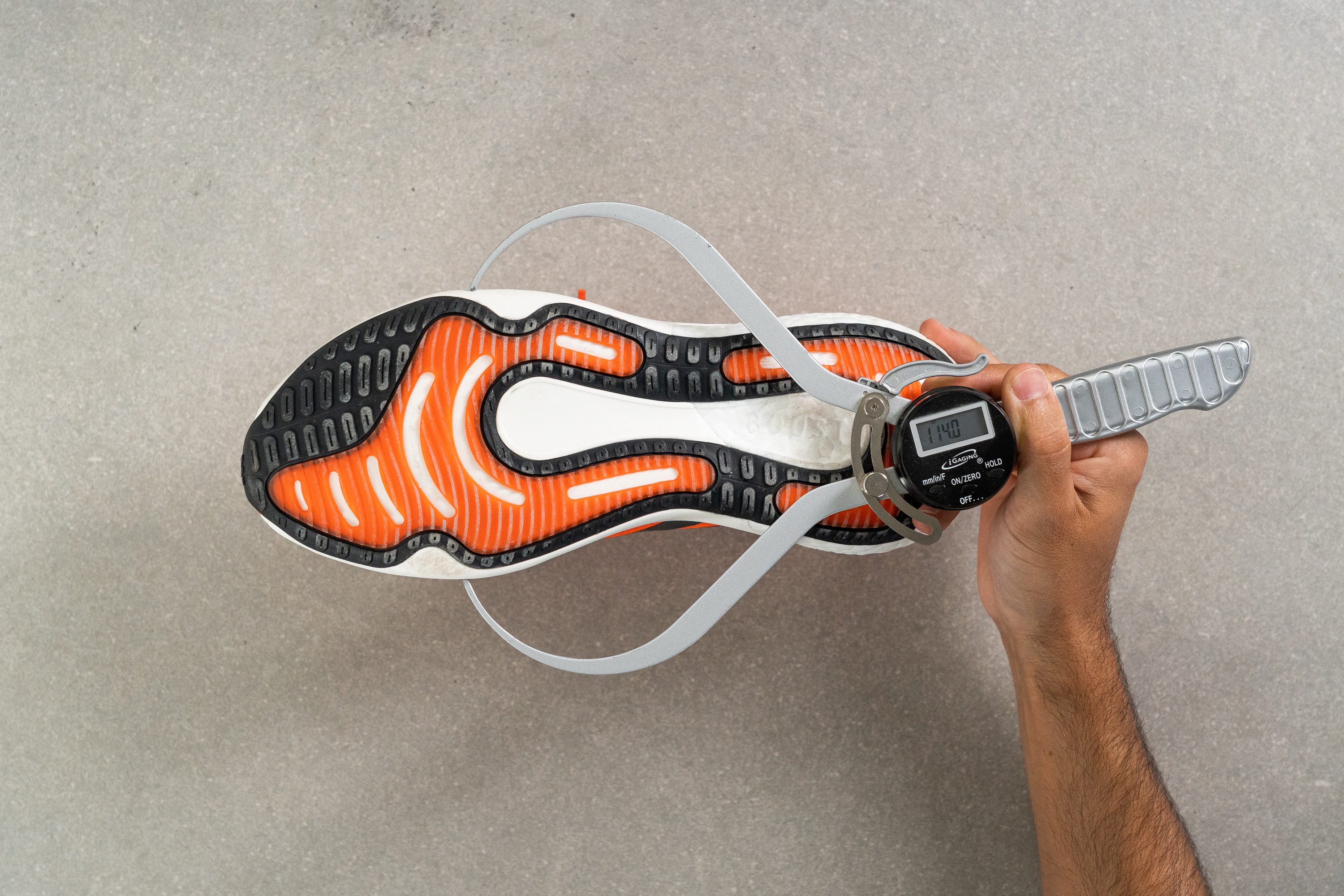
| Supernova 2 | 114.0 mm |
| Average | 114.4 mm |
Midsole width - heel
The midsole is also wider at the heel than our current lab average, but by a much greater margin. Measuring 97.2 mm according to our calliper, the Supernova 2 boasts an extra-wide landing platform for heel-striking runners and a much more stable feeling underfoot.
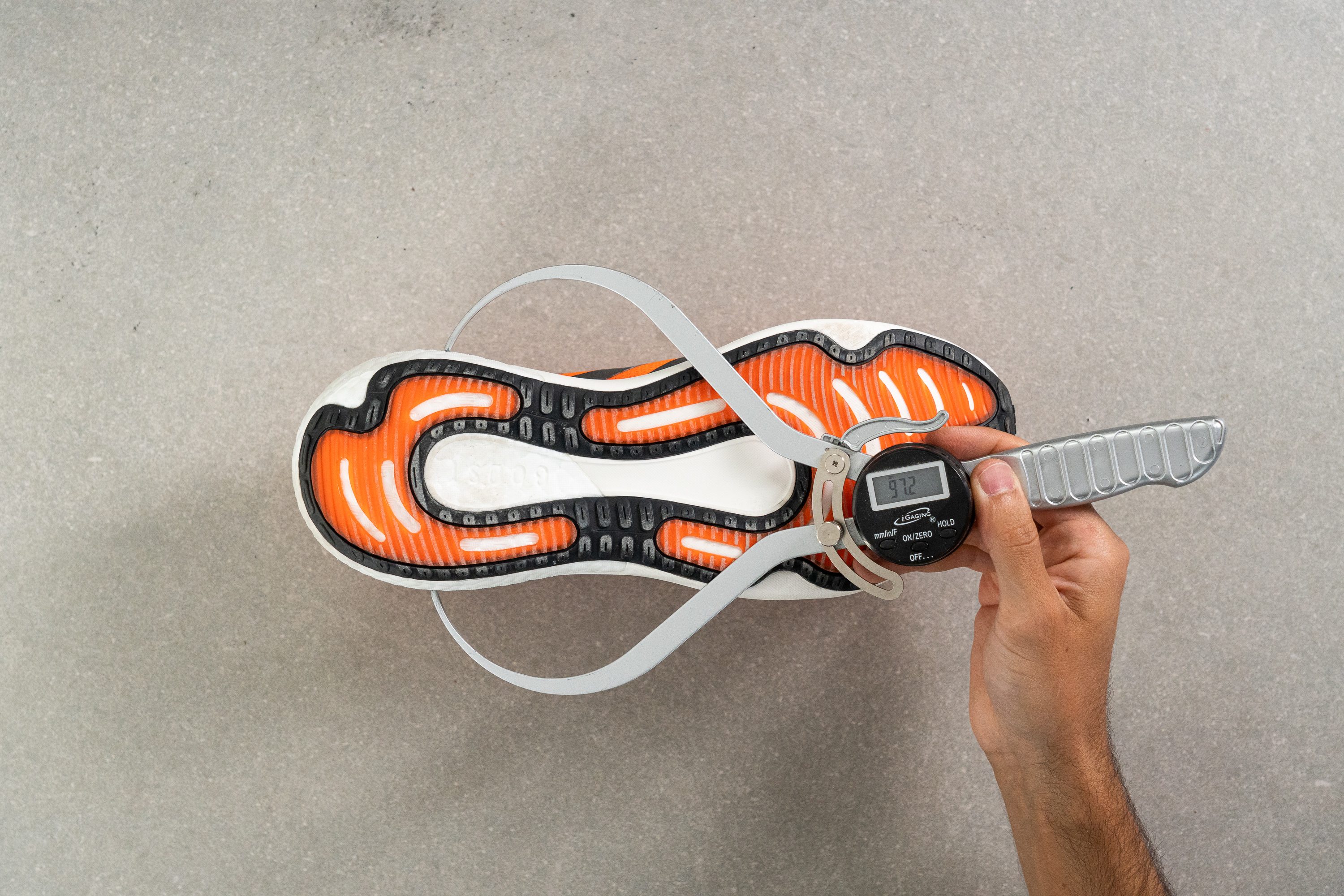
This does give the Supernova 2 a rather blocky and less-than-aerodynamic silhouette, despite its sleek look when viewed from the profile. This explains the shoe’s clunky feeling whenever we pushed it to higher paces during our test runs.
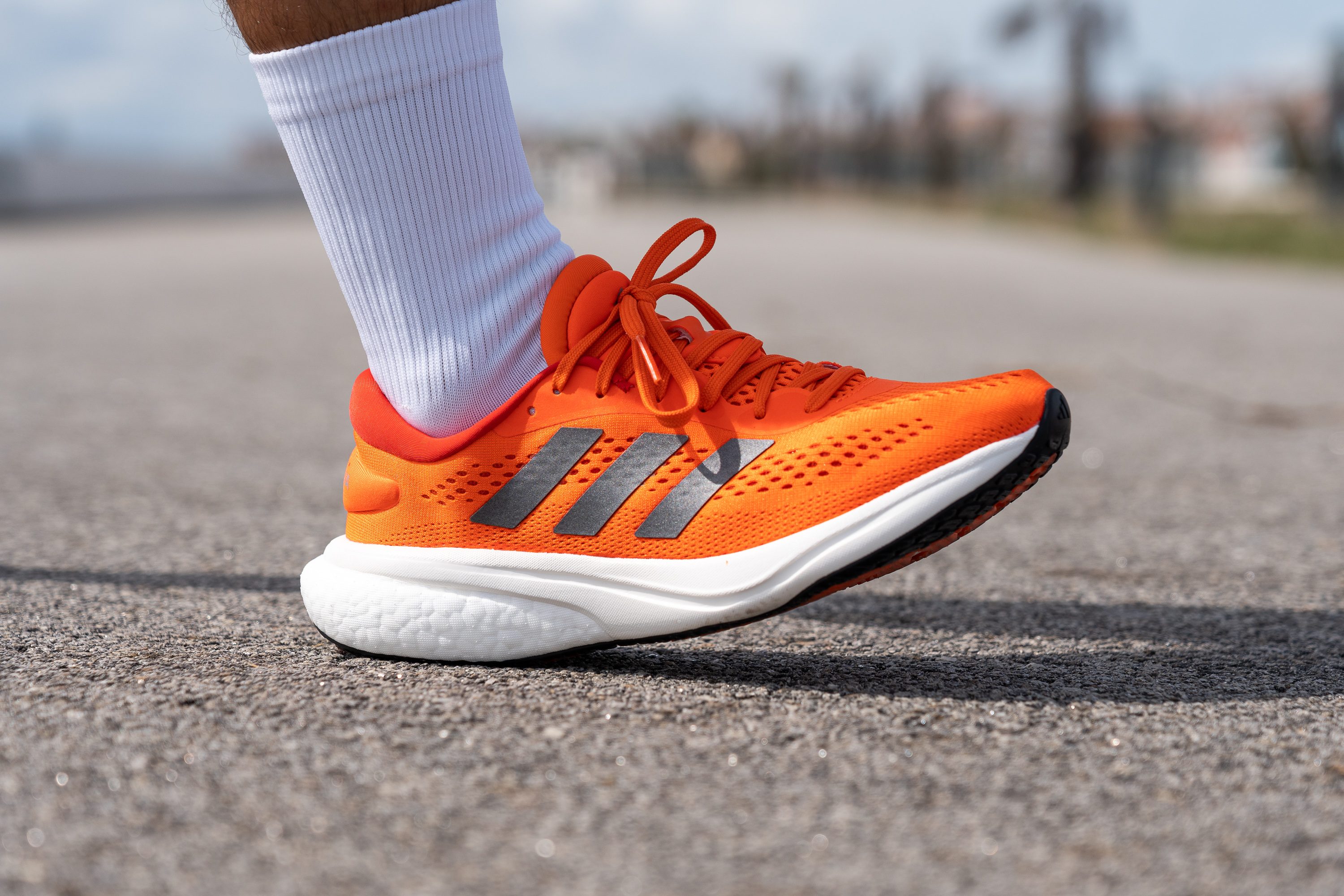
| Supernova 2 | 97.2 mm |
| Average | 90.6 mm |
Durability
Toebox durability
Unsurprisingly for a budget shoe, the toebox is highly prone to tears.We applied our dremel to a section of the Supernova 2’s toebox with at 10K RPM with a force of 3.2N to simulate extreme wear and tear. Our tool absolutely shredded through the shoe’s upper mesh and left a gaping hole big enough for our toes to pop through after the four second test, giving the Supernova 2 a score of 1 out of 5.
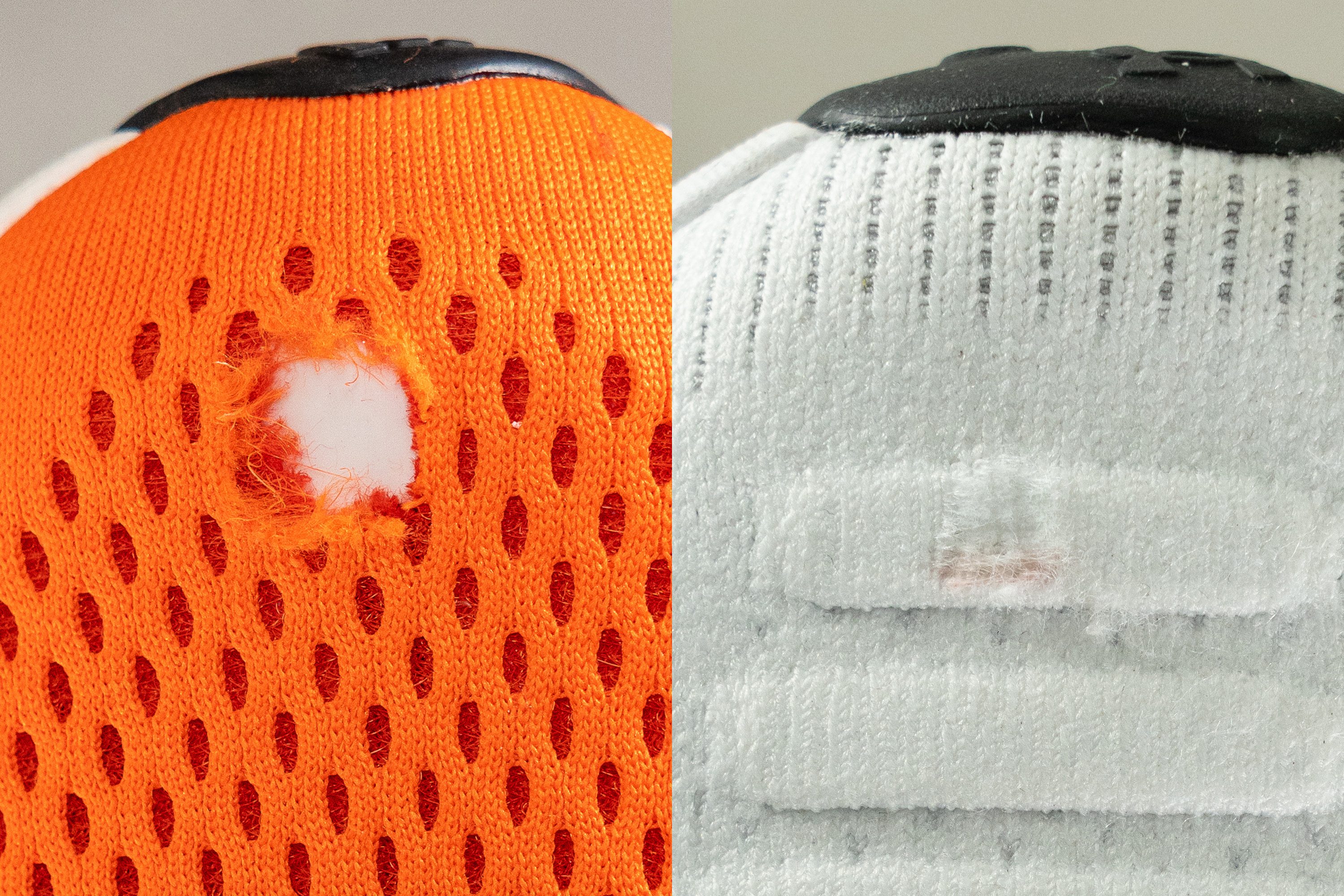
For comparison; have a look at the damage on the Supernova 2 against the Under Armour Hovr Phantom 3 as an example of a much more durable shoe.
| Supernova 2 | 1 |
| Average | 2.6 |
Heel padding durability
The heel padding suffered a similar fate to the toebox. Pressing our dremel against the heel collar for the same amount of time with the same force tore a massive hole in the shoe’s material and ate away a good chunk of padding. This leads us to give the shoe a score of 1 out of 5 for heel durability,
We therefore recommend avoiding going sockless in the Supernova 2 as excessive friction from heel rubbing will negatively affect its comfort and ability to secure the foot, and might spell an early end for the shoe.
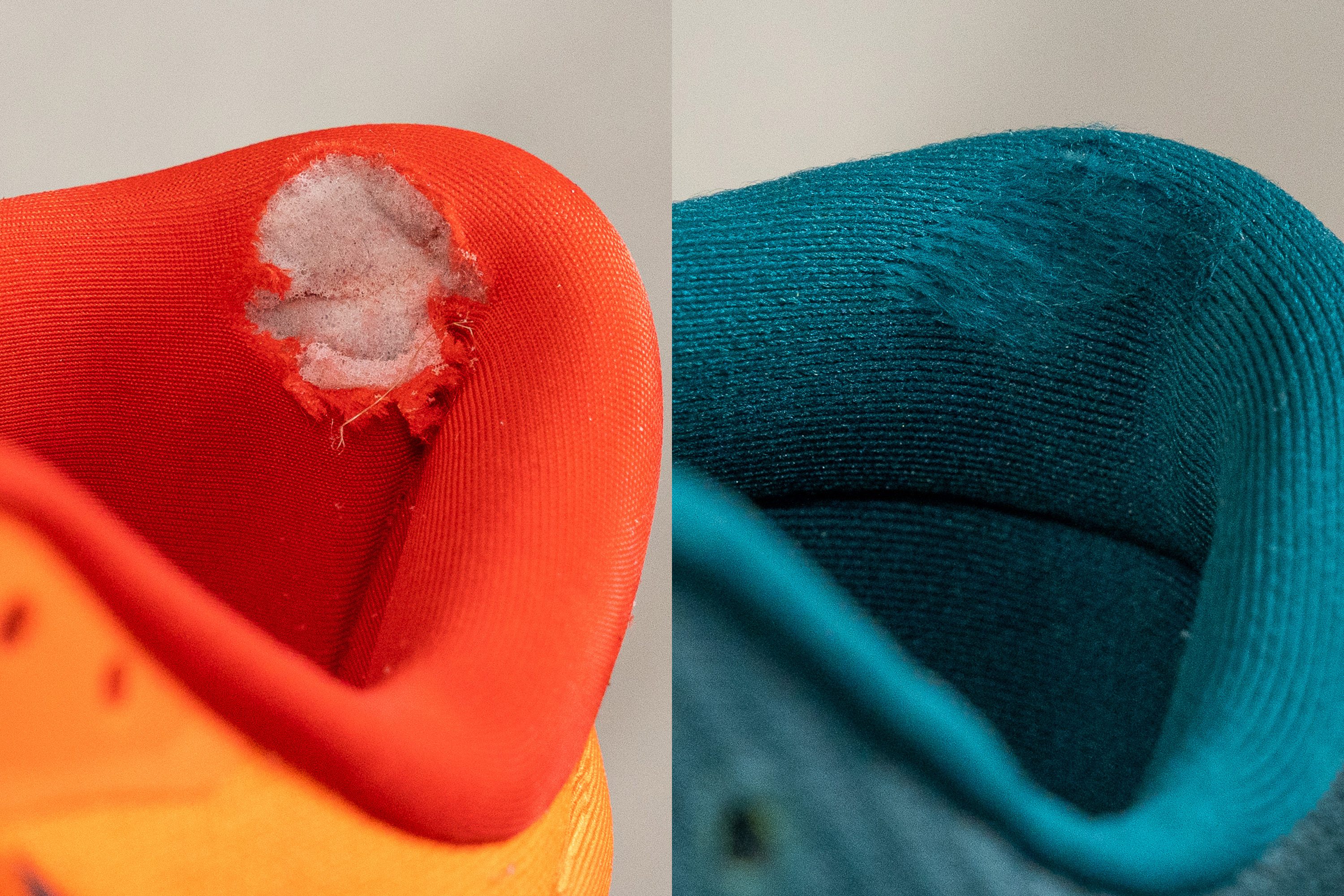
For an example of a shoe that is much more resilient around the heel, look at how the ASICS Metaspeed Sky+ fared against the same test. It does come with a much higher price tag, which goes to show that you get what you pay for.
| Supernova 2 | 1 |
| Average | 3.4 |
Outsole hardness
With a reading of 76.3 HC when we pressed our durometer against it, the Supernova 2’s outsole is marginally softer than our current lab average. We found this level of hardness to nicely complement the soft landings provided by the midsole cushion, while still being soft enough to bite into the pavement and provide us with good traction.
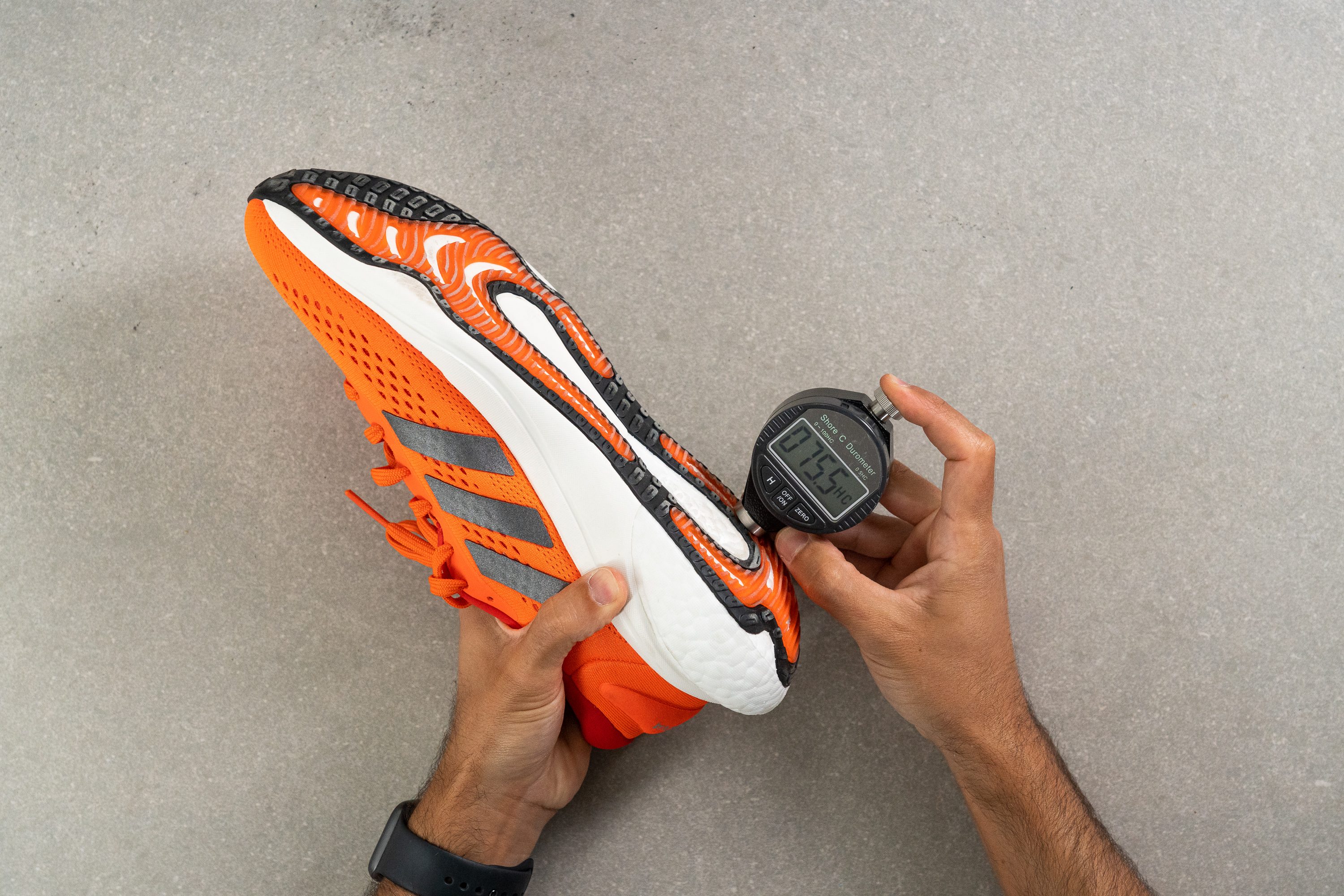
| Supernova 2 | 76.3 HC |
| Average | 79.2 HC |
Outsole durability
The results of our dremel test on the outsole are frankly abysmal. Our tool’s grinding element faced no resistance as it absolutely minced through the Supernova 2’s rubber outsole and, eventually, its midsole foam. The aftermath of our four second test looks as though we dropped a molten rock on the outsole which melted its way all the way through to the Supernova 2’s midsole.
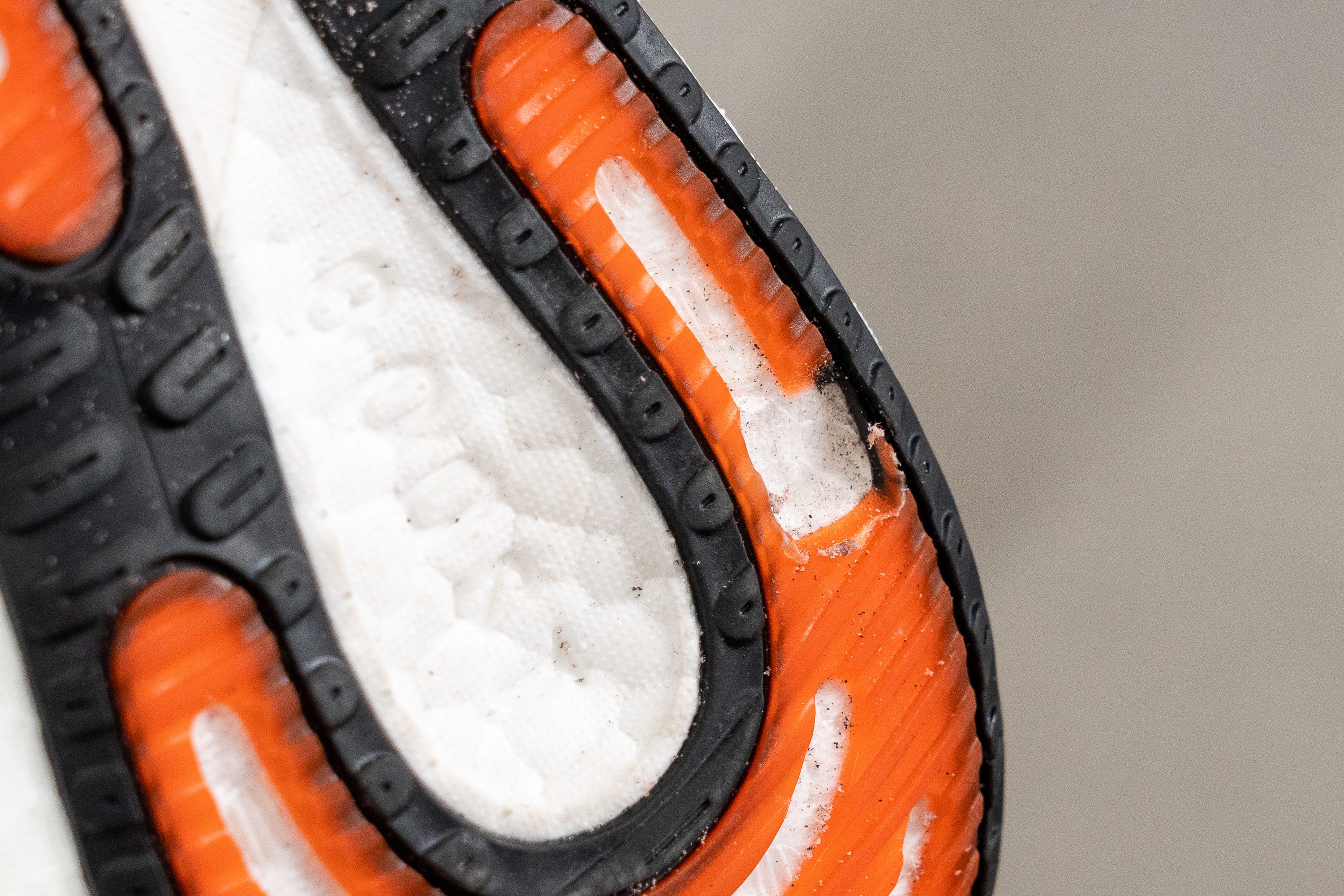
As a result, we’d be surprised if this shoe makes it to the 400 mile mark before the outsole totally degrades underfoot.
| Supernova 2 | 5.8 mm |
| Average | 1.1 mm |
Outsole thickness
Measuring only 2.9 mm according to our caliper, the Supernova 2’s outsole is thinner than our current lab average. This wouldn’t ordinarily be an issue; but with the rubber that makes up the outsole being so frail, we would be happier with more of it to improve the shoe’s longevity.
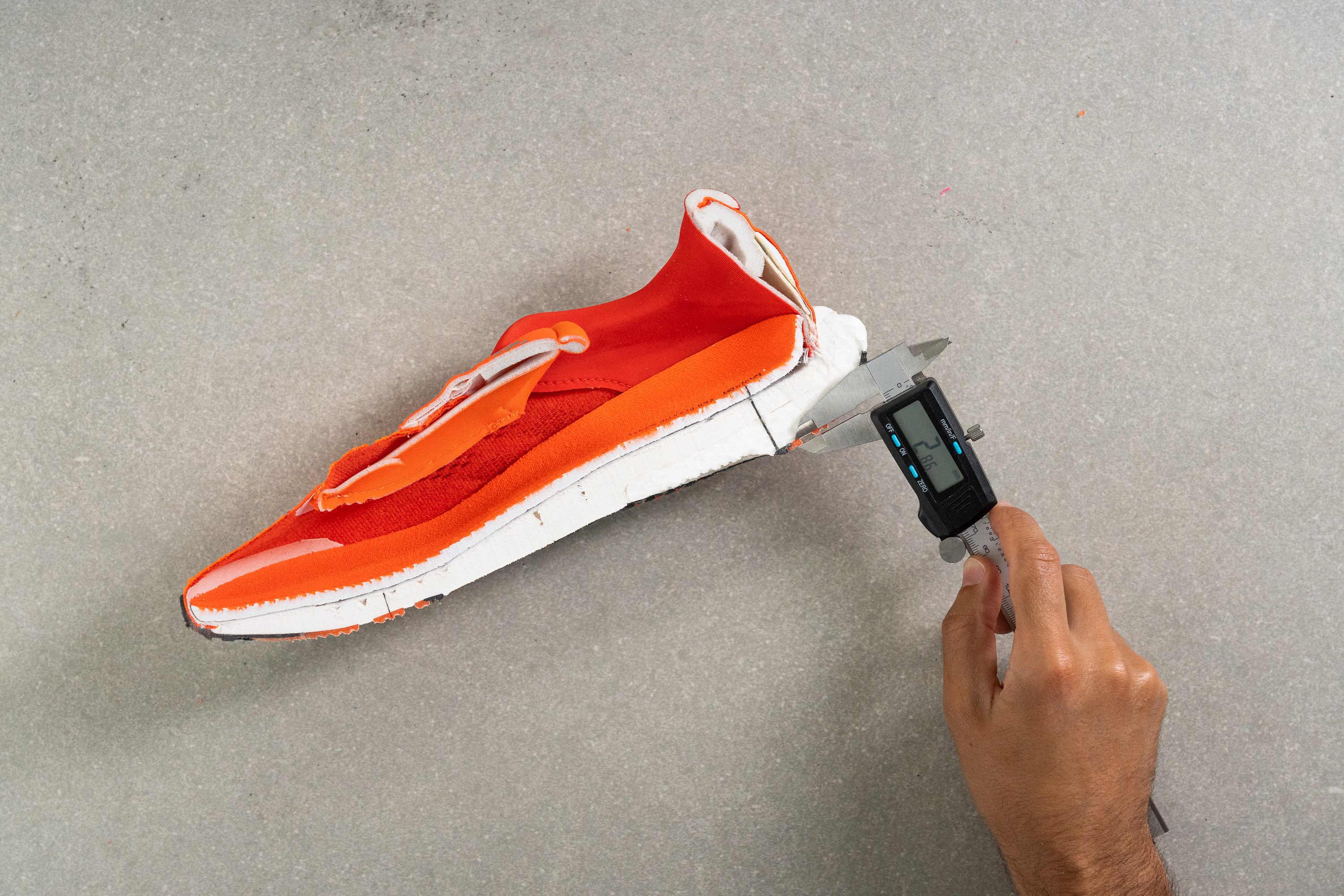
| Supernova 2 | 2.9 mm |
| Average | 3.2 mm |
Misc
Insole thickness
At 4.5 mm, the Supernova’s insole falls right within the average range for road shoes.
While we do measure the stack including the insole, this does not account for the stack and drop disparity previously mentioned. They must have misplaced their ruler that day.
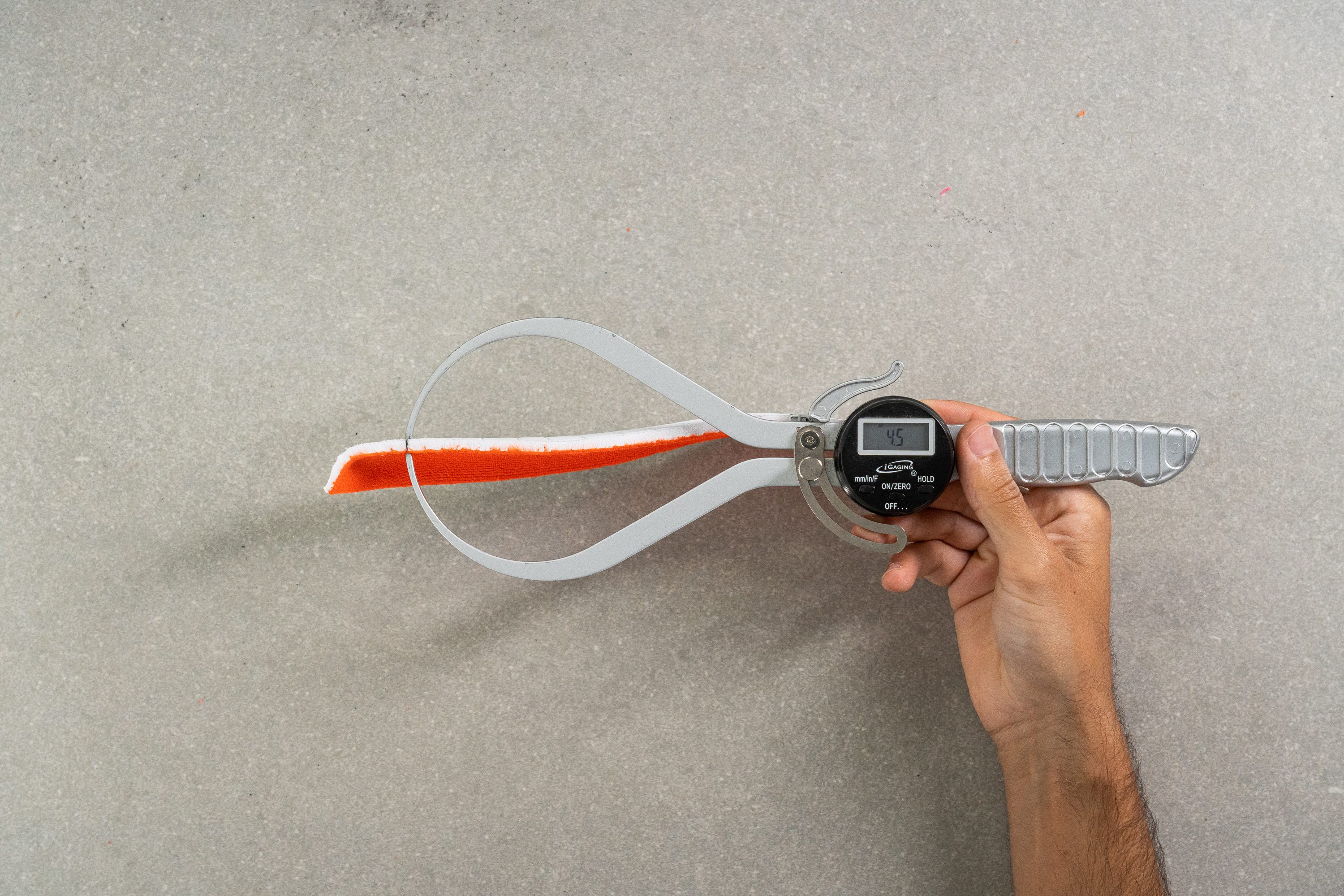
| Supernova 2 | 4.5 mm |
| Average | 4.5 mm |
Removable insole
The insole of the Supernova 2 is removable, so runners can replace it with custom orthotcis if needed.
| Supernova 2 | Yes |
Midsole softness in cold (%)
We left the Supernova 2 in the freezer for twenty minutes to simulate exposure to cold weather, and the foam did stiffen up quite significantly compared to the average shoe. With a reading of 35 HA, the shoe’s cushioning will definitely feel more firm than balanced in the winter.
According to these readings, the Supernova 2 gets 57.1% more firm when exposed to frigid conditions. This is much higher than the average shoe
For a shoe that is more consistent between warm and cold weather, we recommend the Adidas Fluidflow 2.0.
| Supernova 2 | 17% |
| Average | 24% |
Reflective elements
The only reflective elements to be found on the Supernova 2 are on the iconic three-stripe logo that adorns the side of the shoe. This doesn’t do much for visibility at night, especially from behind, so we recommend wearing reflective clothing when running in the dark.
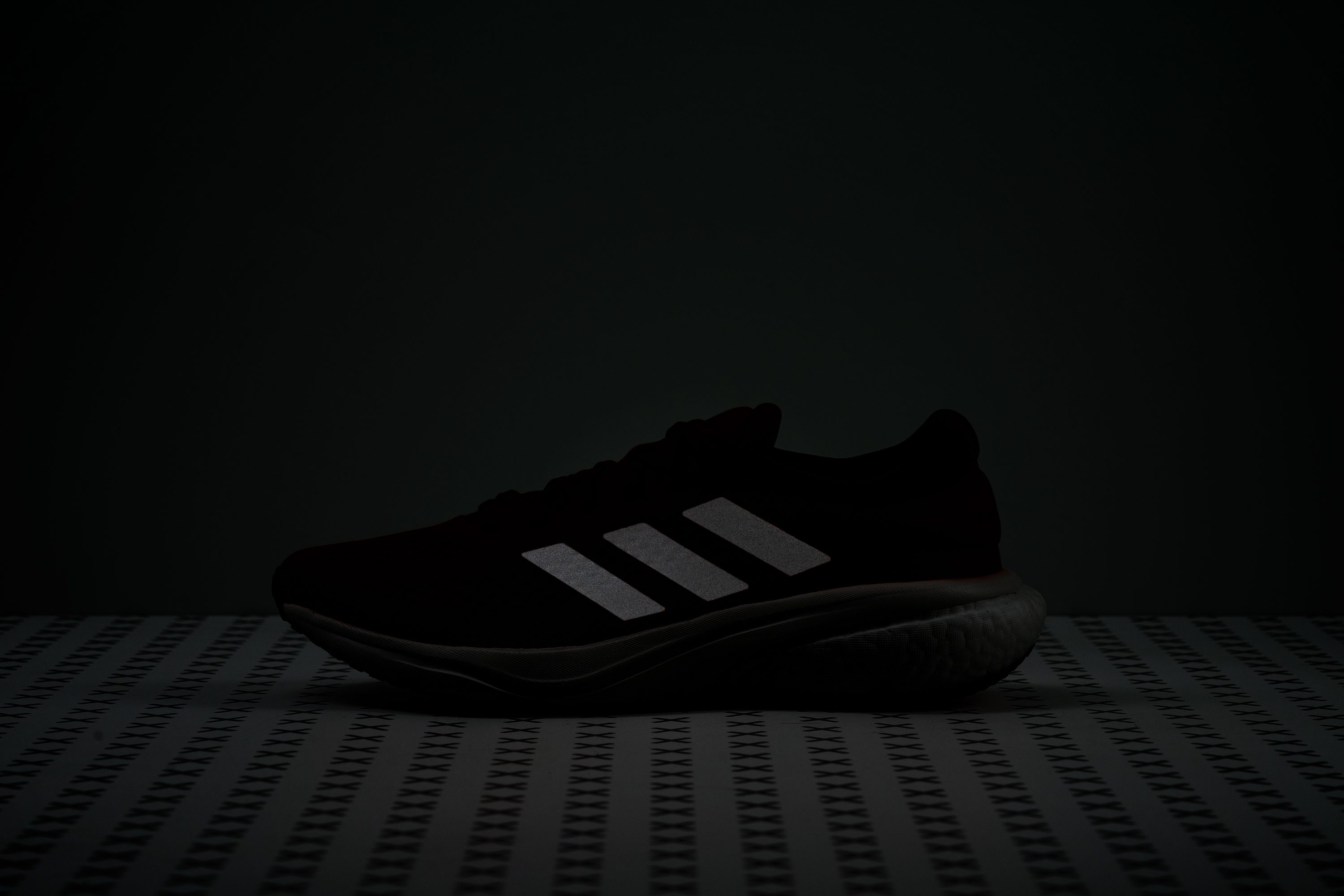
| Supernova 2 | Yes |
Tongue padding
The Supernova 2’s tongue also features an almost unreasonable amount of padding. Measuring 9 mm according to our caliper makes the shoe’s tongue much more plush than the average shoe. This makes the shoe feel incredibly comfortable around the instep, with no chance of us experiencing lace-bite no matter how tightly we laced them up.
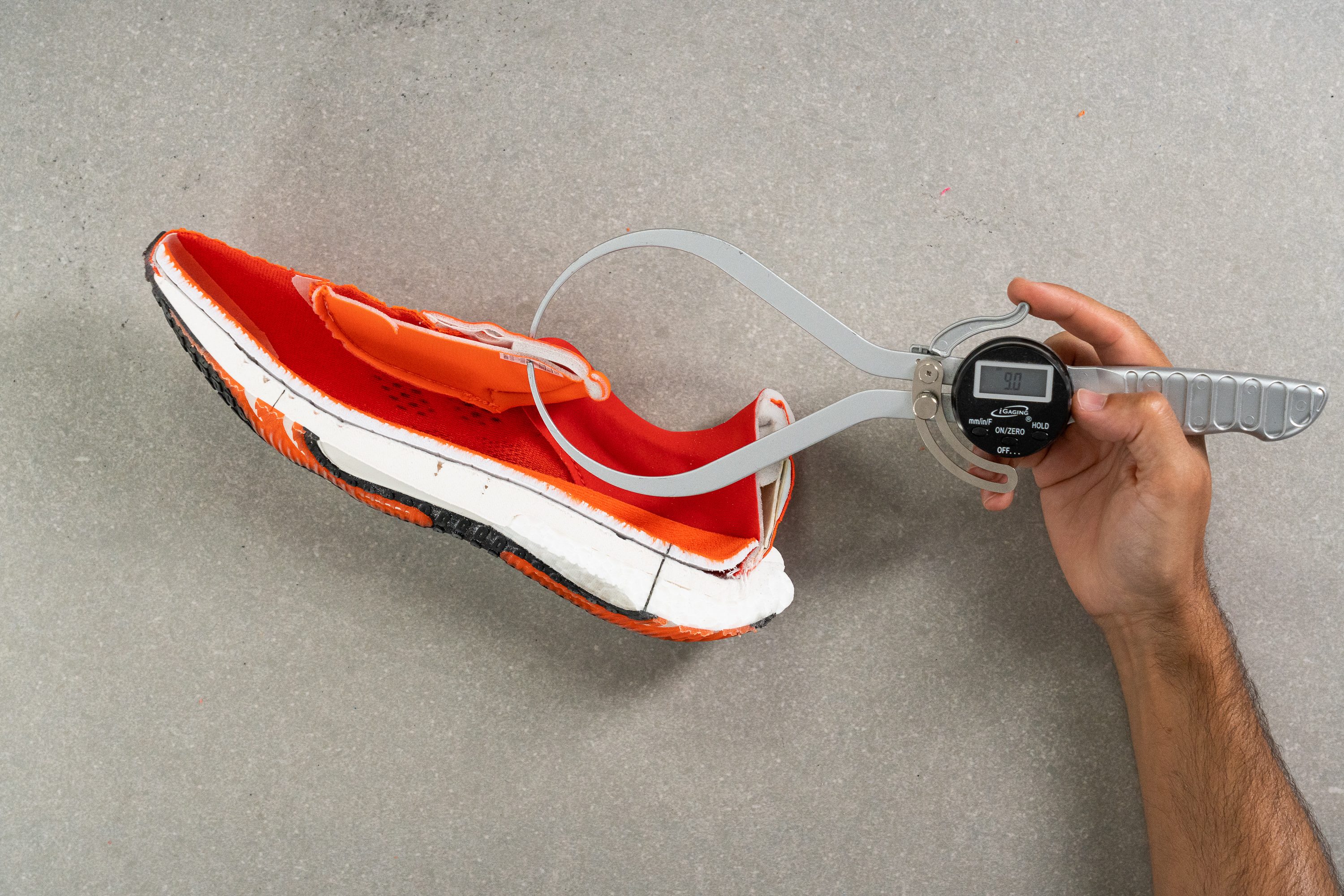
| Supernova 2 | 9.0 mm |
| Average | 5.7 mm |
Tongue: gusset type
The tongue is non-gusseted but features a lace-loop to mitigate movement. Even so, we did notice some tongue slippage during our test runs.
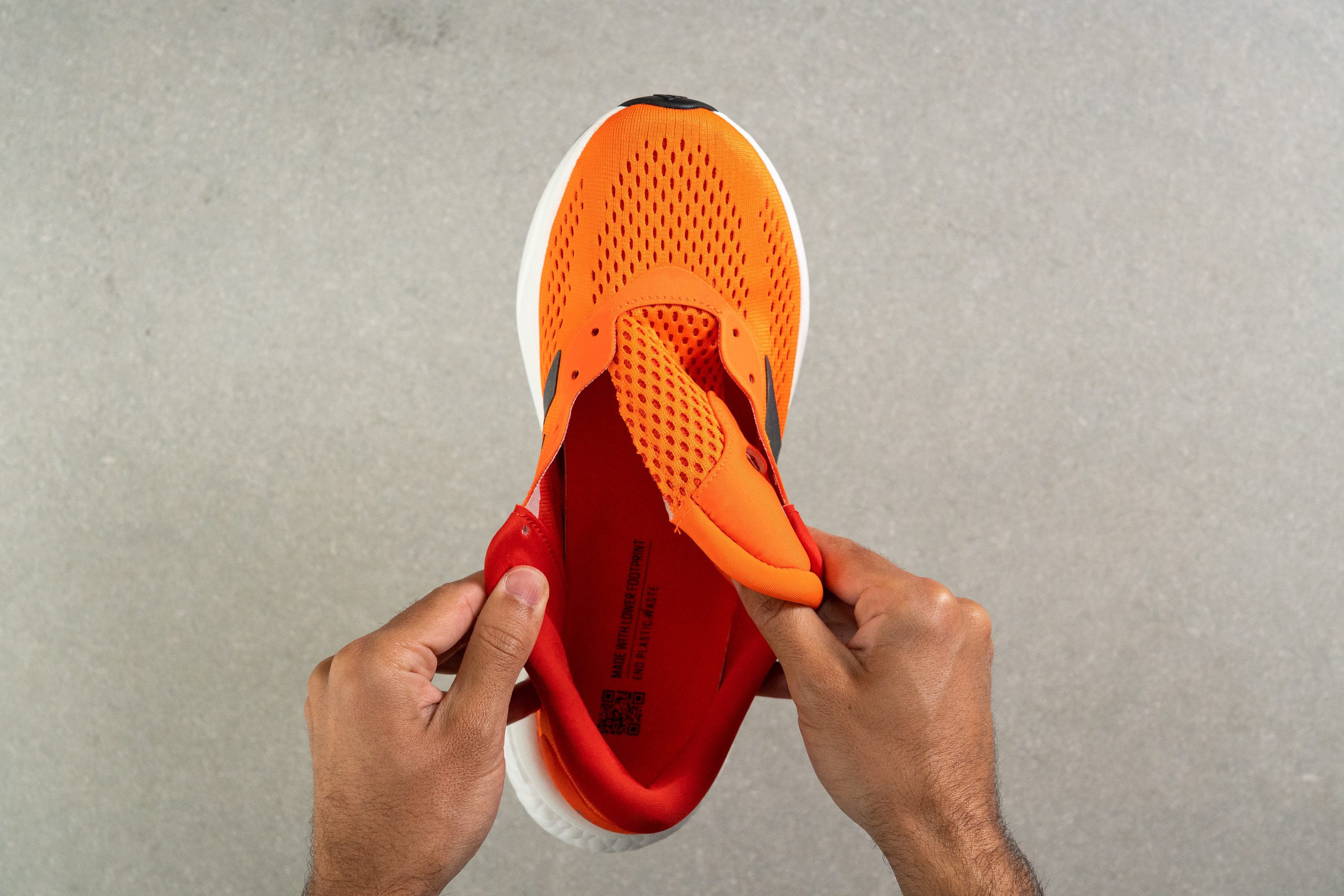
| Supernova 2 | None |
Heel tab
The Superanova 2 doesn’t include a heel tab; but the heel’s shape, which somewhat resembles an elf-ear tab, is extremely easy to slip in and out of.
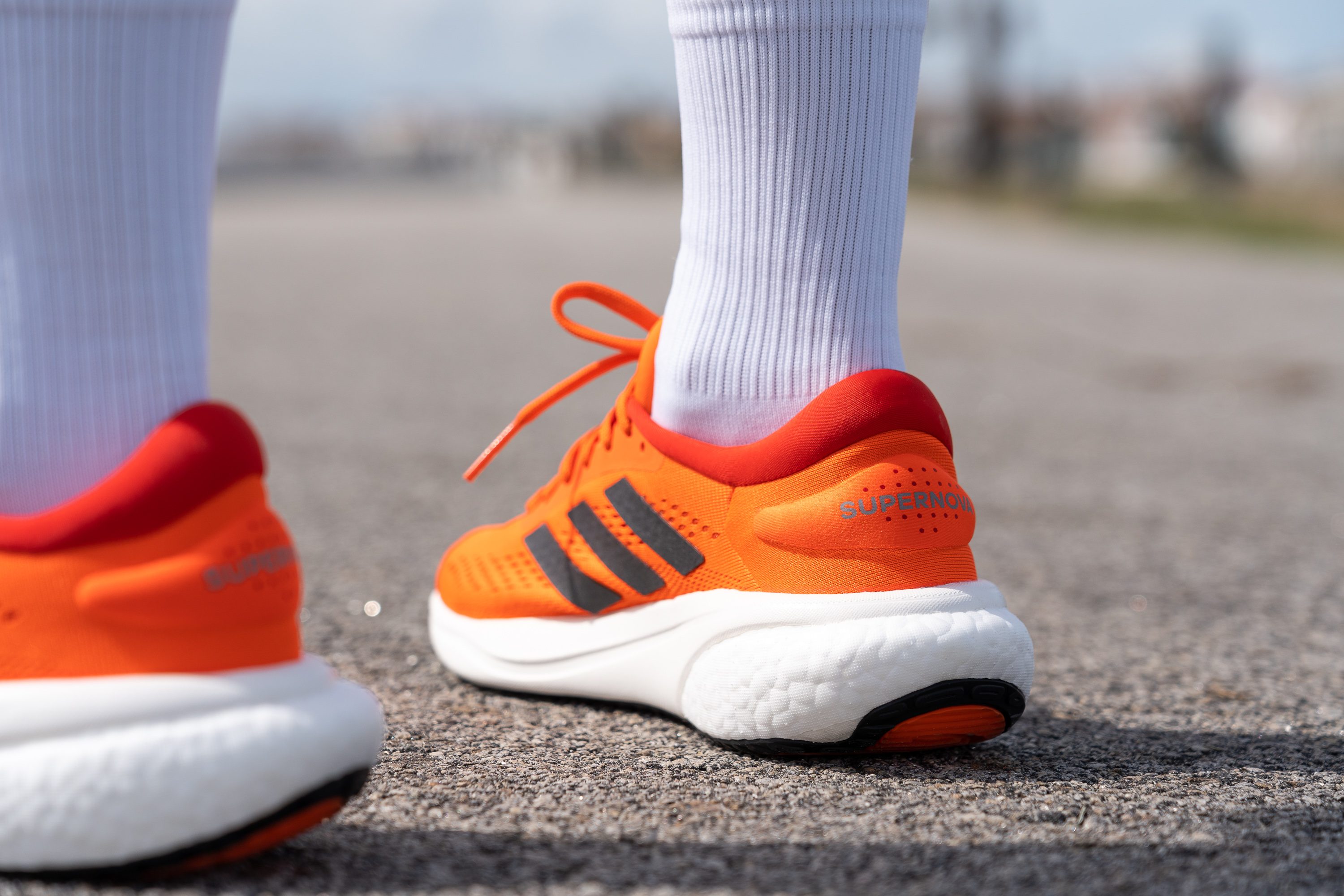
| Supernova 2 | None |

